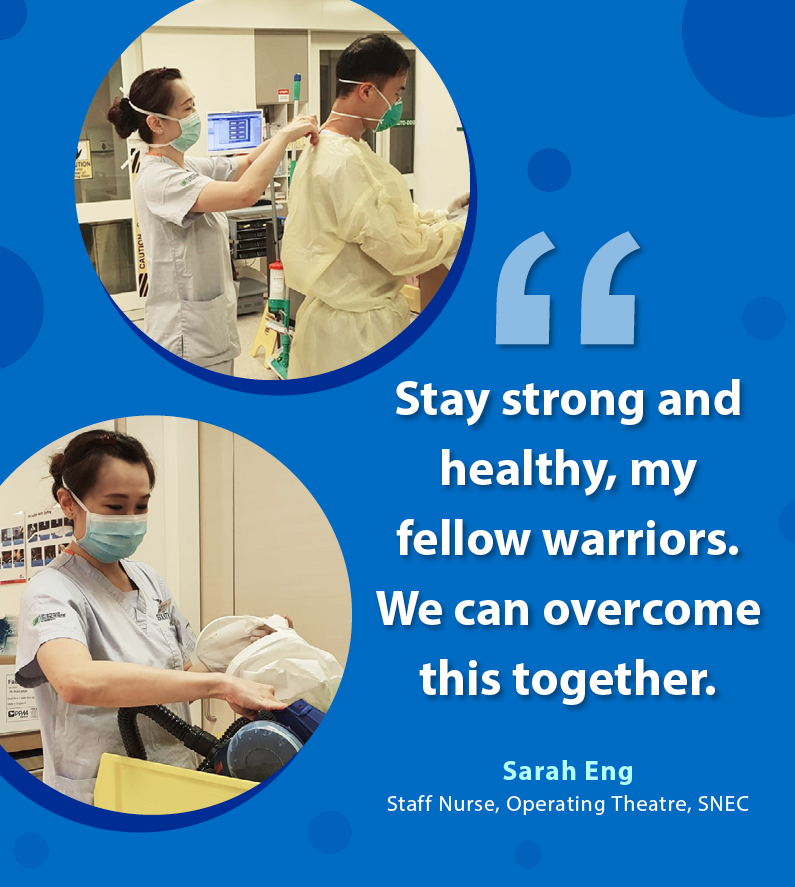
Our Unsung Heroes
Fighting #COVID19 together as #OneSNEC-SERI
Here's a shout-out to all the unsung heroes at SNEC and SERI. We are grateful for your sacrifices. Thank you for keeping Singapore safe!
Celebrates Singapore Nurses' Day
Today is Singapore Nurses’ Day.
Nurses’ Day is a day to honour and recognise the work of nurses, who are on the frontline of Singapore’s healthcare system. Their work has been more crucial than ever in light of the COVID-19 pandemic.
As we salute these amazing people blessed with a heart for the sick and infirm, we at SNEC and SERI wish to highlight two of our nurses who have gone above and beyond their call of duty.
Meet Senior Enrolled Nurse Corine Teng and Senior Nurse Manager Tay Li Kheng, both of whom are actively involved in VisionSave, a philanthropic initiative of SNEC and SERI.
Corine, having spent the last 20 years caring for patients at SNEC’s Glaucoma Clinic, is acutely aware of the need to have access to eye treatments. This is why she not only contributes personally to VisionSave, but also enthusiastically throws herself into its fundraising activities.
Li Kheng, another 20-year veteran of SNEC, is currently serving at the Outpatient Clinic. She, too, has been a regular donor to VisionSave, and will support fundraising activities to help needy patients.
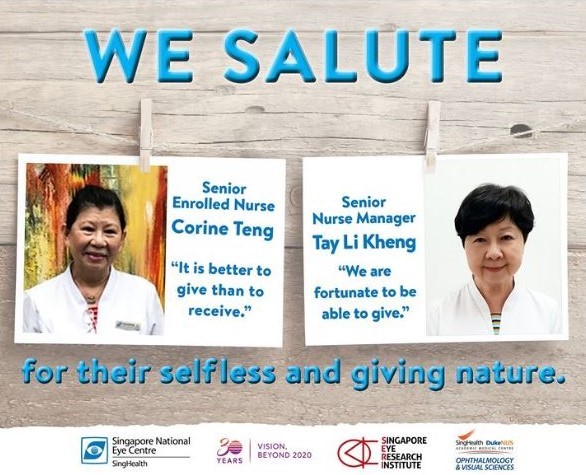
Click here to
read their stories.
We salute you, nurses! Happy Nurses’ Day!
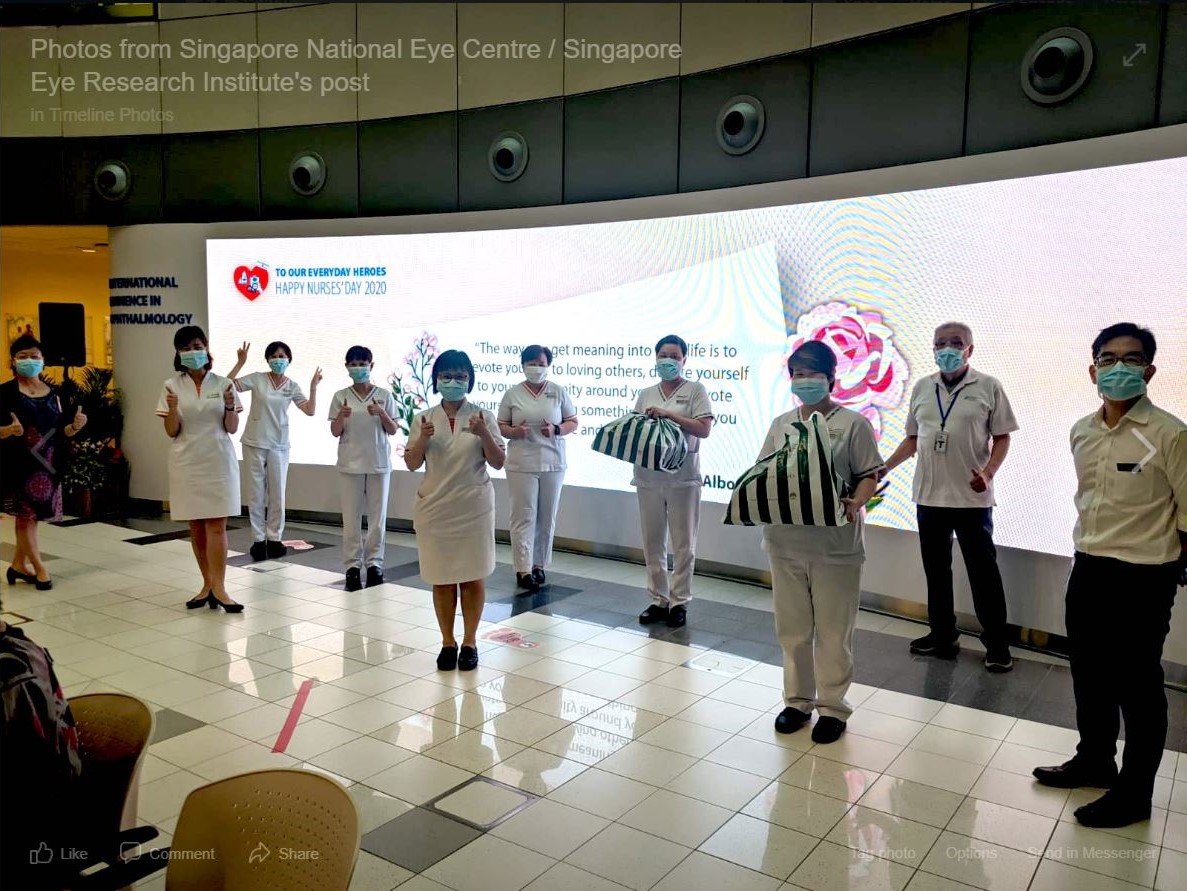
Click here to
read the post.
SNEC-SERI Celebrates Happy Nurses' Day 2020
Today is Nurses’ Day at SNEC and SERI. Due to the restrictions on public gatherings, these healthcare heroes won’t be getting the mass celebrations they more than deserve.
With our hands on our hearts, we sincerely thank and salute you, dear nurses, for showing boundless empathy, infinite patience and selfless dedication in your duty of care towards patients while keeping the rest of the public safe, especially during this COVID-19 pandemic.
Happy Nurses’ Day!
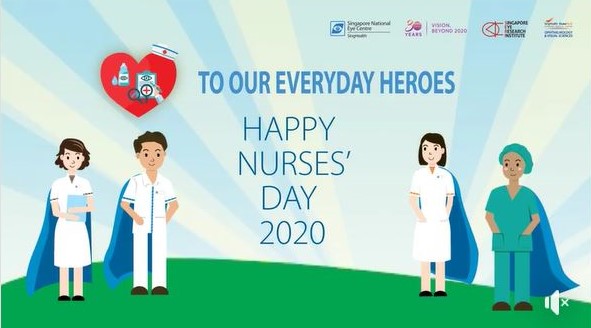
Click here to
read the post.
Happy Nurses' Day 2020
As the battle against COVID-19 continues, we want to salute all our nurses for responding selflessly to care for the sick. Check out the Nurses’ Day visuals that are put up at campuses across SingHealth and read about the sacrifices made by our nurses and how they overcome the new challenges that come with the pandemic.
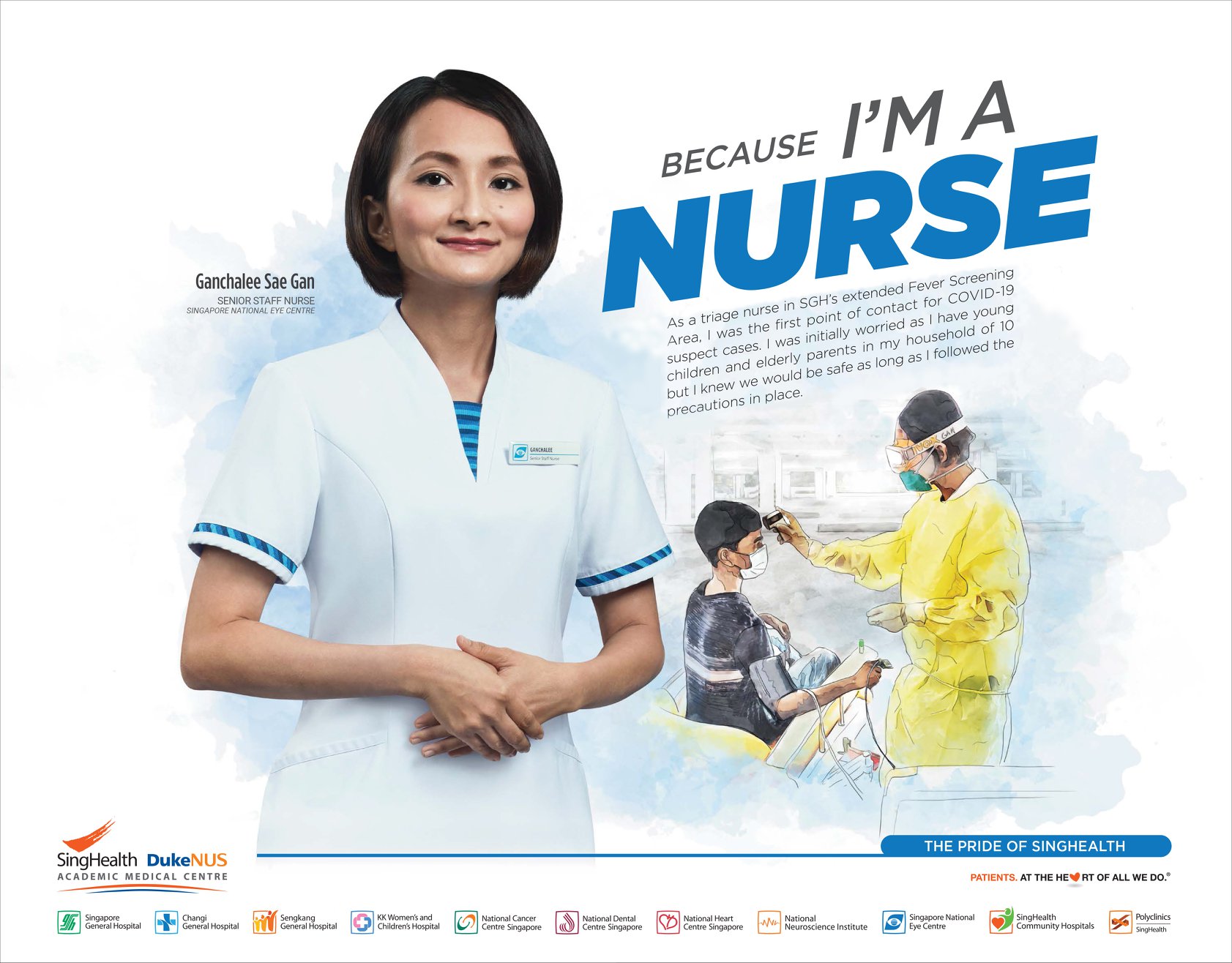
Click here to
read the post.
Portraits of courage: Lakshmanasamudram S Mohanram
For a month, from mid-May to mid-June, Mohan was deployed at migrant workers’ dormitories to help manage COVID-19 infections among the residents. He is back in SNEC as his specialist training is in short supply, but looks back fondly at his volunteering stint. “I miss volunteering,” he says. “It was fulfilling to help people during a crisis; I was very happy to go and help.”
Able to speak a few Indian languages, it was no surprise that Mohan volunteered to be a translator, since many of the dorm residents hail from India. “I’m from the Indian state of Tamil Nadu,” he shares. “I know Tamil, Telugu and Hindi. Most of the patients speak Tamil and Telugu. There are Bengali patients, too; I don’t speak that language, but some of them understand Hindi.” At the dorm medical post, Mohan stepped in when doctors needed help explaining certain terms to the patients; he also translated what the doctor said. This really sped up the consultation process. In addition, Mohan describes how relieved the patients became once they “finally knew what was happening”.
Although Mohan volunteered to be a translator, he was roped in to do much more. “I was part of the admin team, playing various roles — patient registration, ushering, assist nurses and doctors, reporting daily patient status, and site logistics.” The role he performed for the day depended on which station he was posted to. But it was helping the foreign workers directly that gave him the most satisfaction as, he admits, “I’m not very good at admin work, as I’m usually directly involved in patient care at SNEC.”
What made admin work even more challenging was the need to do it while wearing full PPE. “We really perspired a lot!” Mohan quips. Because of safety protocols, drinking water was next to impossible, especially when things got busy, so “we drank a lot of water before we suited up”. What mitigated his physical discomfort was seeing how everyone stepped up to help, regardless of rank and experience. “Even the doctors were wiping down the patient’s chair after a consultation. Nobody waited for someone else to do it.”
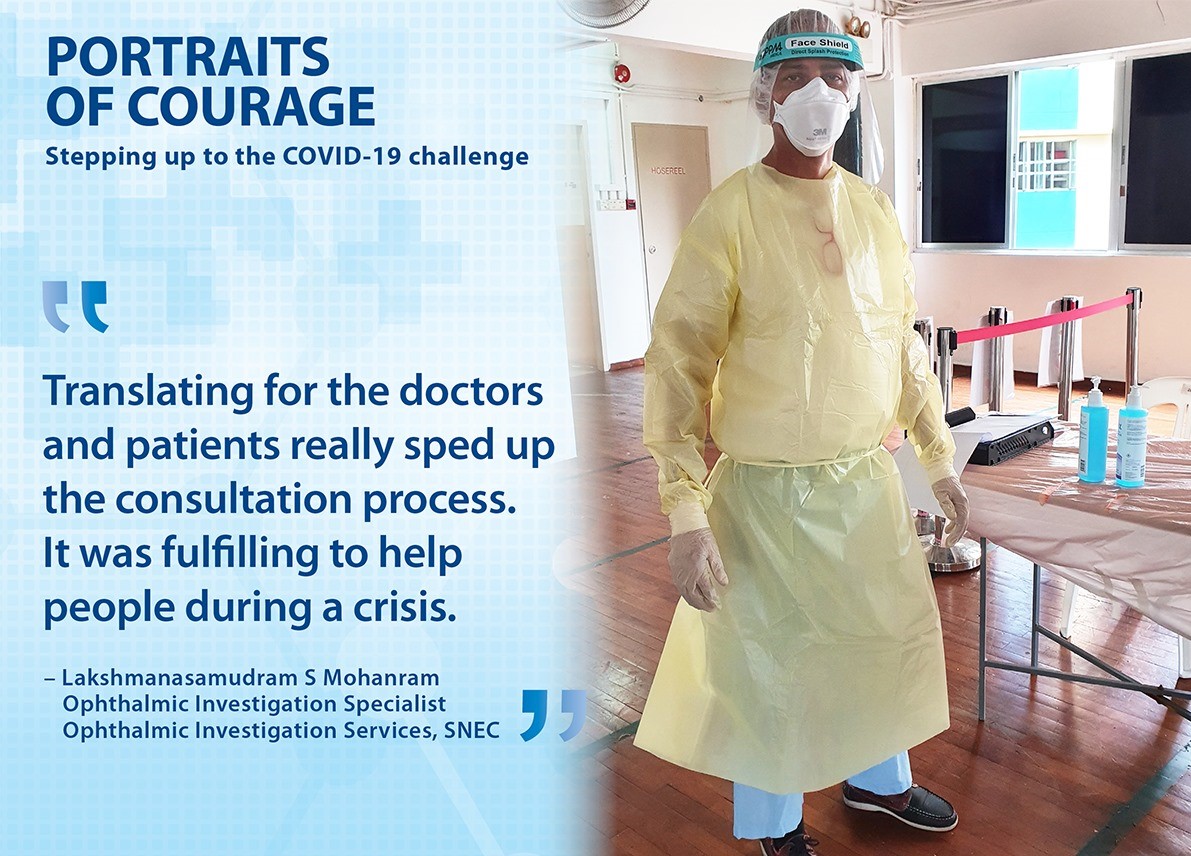
Click here to
read the post.
Portraits of courage: Dr Lim Sing Hui
Too young to volunteer her services when SARS struck Singapore in 2003, Dr Lim Sing Hui was eager to do so when the COVID-19 pandemic hit Singapore. After all, she has completed her medical degree at Duke-NUS, and is currently a third-year ophthalmology resident at SNEC. When the call came for volunteers to be stationed at migrant worker dormitories experiencing high rates of infection, Dr Lim saw many of her seniors and peers stepping up, and was inspired to do the same. “I’ve never felt more ready to contribute directly at the frontline,” she asserts.
Dr Lim was stationed at Cassia@Penjuru dormitory from May to June 2020, and was assigned the 8.30am–3pm shift. During each shift, she put on personal protection equipment before seeing the workers for acute ailments or to manage their chronic conditions and prescribe medications. There, she treated migrant workers who have “worked tirelessly behind the scenes to construct the many amazing buildings and landscapes of our country”. She adds that the migrant workers appreciated what she and her team were doing for them. “They would wave at us from their rooms above while we are in the resting area having lunch!”
What also left a deep impression on Dr Lim during her volunteering stint was the strong team spirit. “Everyone helped each other readily, be it the registering of patients, taking of their vitals, performing swabs, or dispensing medications,” she enthuses. The upbeat and positive vibe among the team, plus everyone’s inherent trust in the safety protocols implemented, made bearable even the deep discomfort of wearing PPE in Singapore’s hot and humid weather!
Dr Lim is also grateful for a solid support system outside the dormitory. “I have been receiving much love and care from my mentors, colleagues, family, and friends. They have called or dropped numerous text messages to convey their concern for my well-being, which I am very thankful for.”
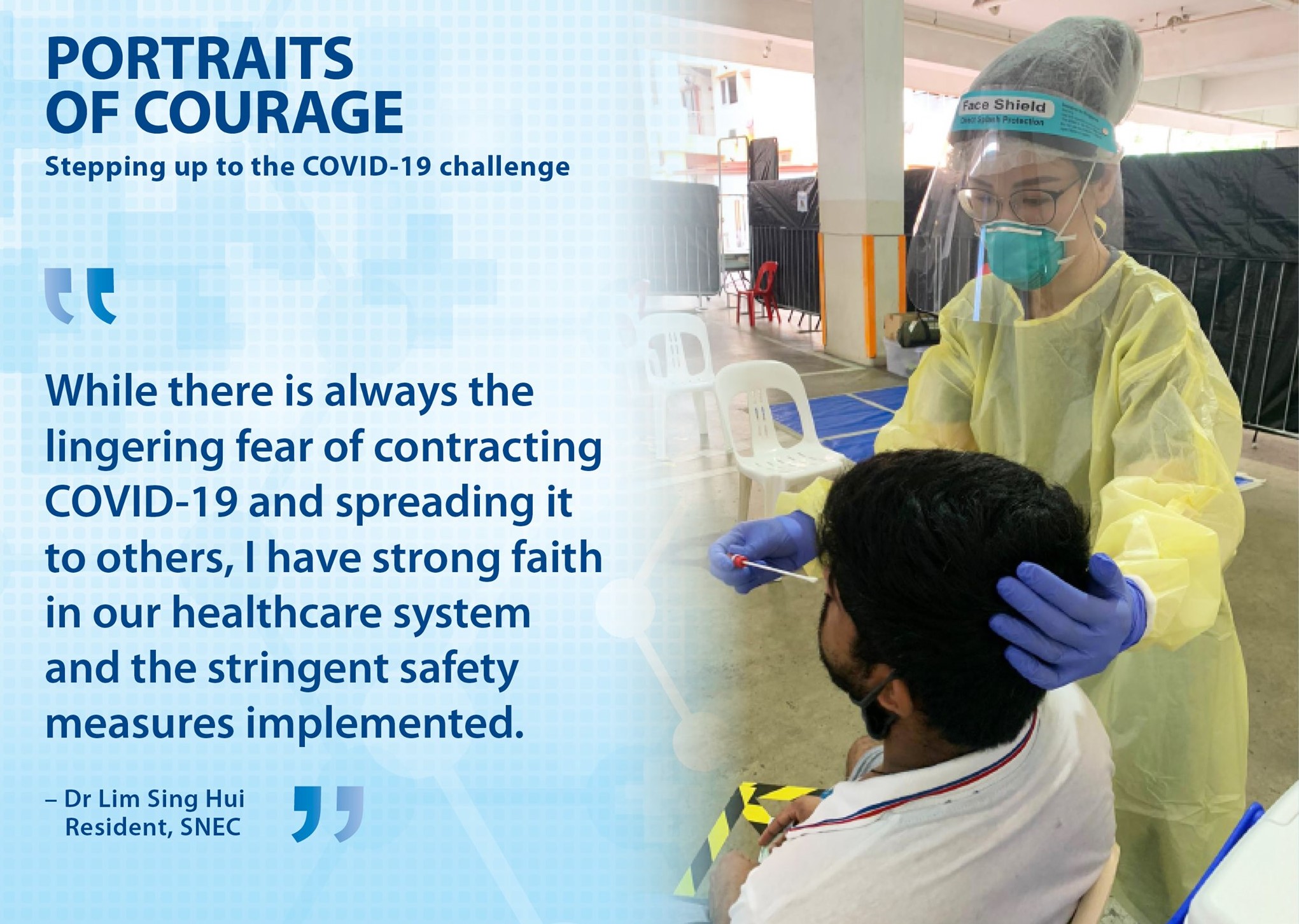
Click here to
read the post.
Portraits of courage: Justin Ng
“Being deployed at the migrant worker dormitories has been an eye-opening experience,” says Justin Ng, a Clinical Research Coordinator with SERI. He volunteered at the dormitories from 20 April to 5 June. As a ‘runner’, his job was to collect swab samples from the different dormitories and send them to laboratories for analysis.
Not being attached to any particular team due to the nature of his duties, Justin had to improvise. “I had to familiarise myself with the different teams and their ways of working, then come up with a system to make everyone’s day a little easier,” he shares. “These connections grew stronger, and I’m glad to have known them during these tough times.” This familiarity extended to the migrant workers. “I also got to know more about the people I was helping.”
While Justin’s working hours often ran into weekends and public holidays, he shares how touched he was by the sacrificial nature of the COVID-19 warriors around him, who frequently and generously offered to chip in on their days off. “Everyone helped one another; it was truly a comforting sight to behold.” On his part, Justin tried to offer simple greetings at the dormitories to distract healthcare workers there from the discomfort of having to don PPE under the blazing sun. “It was my way of giving encouragement and letting them know that we’re in this together. I hope to have dropped a hint of positivity within the group to keep them going,” he enthuses.
Besides caring colleagues, another source of comfort for Justin was the support he received from family, friends and supervisors during that period; they sent him words of encouragement from time to time, and reminded him that what he was doing was for something much larger than himself. What leaves Justin discouraged, though, is the misconception that healthcare workers are not ‘clean’, and are sure to catch COVID-19. Eager to bust this myth, he stresses, “While there is a risk of catching the virus as we face COVID-19 patients every day, our strict adherence to safety protocols — such as wearing PPE and disinfecting everything that we have come in contact with — brings that risk down significantly.”

Click here to
read the post.
Portraits of courage: Darren Teo
“I volunteered for deployment at the dorms, thinking that I would just be helping out at the registration area, so I was shocked when I was assigned such a big role,” says Daren Teo, who was in charge of the Command Centre at a Swab Isolation Facility (SIF) from 1 May till early June. She has since gone back to her regular duties as Senior Manager of Operations in SNEC.
In her SIF role, Daren coordinated with several agencies on their conveyancing plans, and translated those plans into something her team can act on. “My role was to engage the critical stakeholders — the medical, admin and facility’s security and maintenance teams to come up with the action plan for the day,” she explains.
Despite her operations experience at SNEC, Daren admits it was daunting initially to run such a large operation. “At the SIF, we received information at 8.30am, and had to come up with the action plan by 9am,” she reveals. “We had to plan for doctors to do medical rounds for the migrant workers who are residing at the SIF while awaiting their swab results, arrange the processes for registration, admission, and transfers to other community care facilities after medical review, as well as ambulance conveyance for those who require further assessment. The number of migrant workers we assisted varied every day. Everything was very fluid; anything could change because of the many variables,” she adds.
On average, Daren clocked 10–12 hours per day; she and her team were also the last to leave as they had to compile three reports daily, at different time intervals, for submission to the agencies. Despite not having a medical background, Daren felt the need to help the migrant workers who are affected by COVID-19. “I do what I can, in my own small way, to support Singapore in its fight against the pandemic,” she shares.
Daren’s family and friends were supportive of her work in SIF, and constantly kept her in their prayers. What also inspired her was the cooperation within and among the various teams from different SingHealth institutions— including playing roles beyond their job scope — to help the migrant workers. She is grateful for the experience. “It forced me to take a pause from my busy routine to ponder what is truly important in life.”
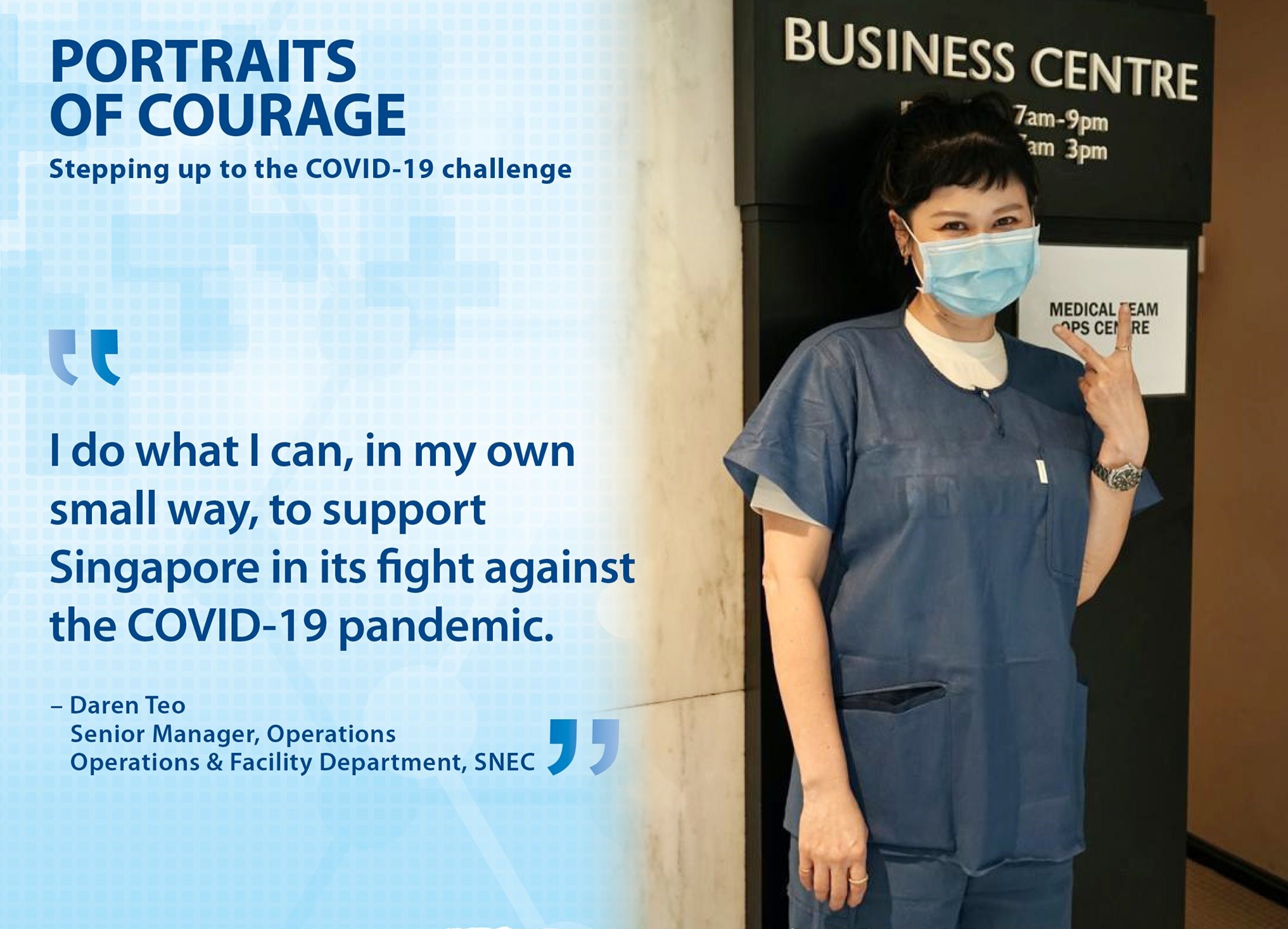
Click here to
read the post.
Portraits of courage: Chritsian S Rimalos
When Christian S Rimalos heard that SGH’s Infection Prevention & Epidemiology Department was looking for volunteers to boost its contact tracing efforts on SGH campus due to the spike of COVID-19 cases, he responded to the call. “I knew I needed to help in some way,” says Christian, who is one of the four staff from SNEC who has stepped forward to work as contact tracers since late March.
An Assistant Manager at SNEC’s Clinical Audit (CA) Department, Christian reveals that most colleagues in his department have undergone training and refresher courses in contact tracing at SNEC through the years. “We’re the tip of the spear when it comes to gathering information,” he assures.
“Contact tracers can be activated at any time, even on weekends and public holidays,” Christian shares. If activated during working hours, he will have to arrive at SGH within 30 minutes; outside working hours, he has an hour. This is on top of his regular duties. His teammates from SNEC include CA Department colleague Yang You Nian, Haneedah Binte Mohamed Ali from Nursing, and Nancy Goh from Listing.
When activated, all of them would conduct a phone interview with suspect or confirmed cases. He adds that an activity map is crucial for each patient they counsel. This is a detailed list of places the patient was at and people he was with in the 14 days prior to the onset of his symptoms. They then call each of these people to verify the information. In order to better assess the risk of virus transmission, contact tracers have to find out whether the people around the patient were wearing PPE, what kind of activity they were engaged in, and how long they were together. If the patient had been on a flight, they will obtain information such as the flight details and seat number from the patient. Christian adds that one of his most challenging tasks is locating foreigners. Another team of tracers will look at reports to check for overlaps in people and place and flag these linkages.
“Contact tracing is a critical step in containing the coronavirus pandemic. I am grateful for this valuable opportunity to be part of this important COVID-19 response work.”

Click here to
read the post.
Portraits of courage: Edward Tan
As the father of a six-month-old daughter, Edward Tan finds it difficult adapting to working from home (WFH) because of COVID-19. “I still need to accomplish my work within a certain timeframe while distracted by a crying baby,” he shares. He also feels guilty for having “no time to play with her”.
Edward is working on split teams’ arrangement, where some colleagues would work from the office while he and a few others work from home to minimise interaction. His scope of work includes managing doctors’ resources and templates. This workload has increased tremendously since WFH began in mid-April. “During COVID-19, almost every day ends at 10.30pm; sometimes I need to start as early as 7.30am,” he reveals. He is on the clock even on weekends. “We pull those extra hours because we want to get things done quickly, and ensure that patients are informed of their rescheduled appointments ahead of time.”
And there is plenty that needs getting done. “A significant number of patients was affected by COVID-19 transmission-prevention measures,” explains Edward, who has been with SNEC for more than two years. These measures include the temporary closure of clinics, and our team of doctors, nurses and allied health staff being deployed on the COVID-19 frontlines. Affected patients have to be contacted — usually via SMS or phone calls — in batches. Understandably, most of the feedback he and his team receive during this period are regarding the deferring of appointments. “We are working flat out to manage all requests,” he assures, and advises patients who need urgent attention to visit the SNEC Acute Care Clinic during clinic hours.
While WFH, Edward and his teammates continue to monitor their temperature twice daily and check for respiratory symptoms to ensure their well-being. Each day, they will send messages via WhatsApp to encourage and motivate each other. And teammates who have to report for work at SNEC are not forgotten. “Sometimes, I will order food and drinks to be delivered to those working at SNEC @ SGH Campus,” he adds.

Click here to
read the post.
Portraits of courage: Mohamed Muhaled Bin Mohamed Wasis
Persuaded by a number of relatives who are nurses, Muhaled made the career switch to healthcare after eight years in the chemical processing industry. “Even before COVID-19 hit Singapore, it was clear that the sector needed more manpower,” he shares. “I really appreciate the support and respect I get from friends; it’s nice to be appreciated.”
As an Operating Theatre Technical Associate, Muhaled’s main duty is the setting up of equipment for various types of procedures. He also helps surgeons and nurses don surgical gowns in the scrub room, and transfers and positions patients from trolley bed onto the operating table.
During Circuit Breaker, only urgent surgeries were performed at SNEC to minimise the risk of coronavirus transmission. With the reduced workload, Muhaled’s team was split in two, and they rotated between SNEC and home. “Besides taking product knowledge refresher courses during the work-from-home period, we were tasked with generating ideas, such as how to clean and disinfect the operating theatre more efficiently.” As a father of two, Muhaled was constantly worried about bringing the virus home. As such, even though he did not handle COVID-19 patients directly, he strictly followed safety protocols while in SNEC, such as wearing a mask all the time, sanitising his hands regularly, and using PPE when handling infectious cases.
Now that Phase 2 of the post-circuit breaker reopening has begun, more services and surgeries are gradually resuming in SNEC. Muhaled has gone back to his usual working hours since early June, and is scaling up his workload to pre-COVID-19 levels. He is also supporting the surgical team to clear a backlog of cases. “It’s like mentally preparing myself for battle,” he quips. One of the scars of this battle is the imprint left on his face by the tight N95 mask, which he still constantly wears while at work. He is also adapting to the new normal of safe distancing, and adjusting his routines to live and work safely despite this pandemic.
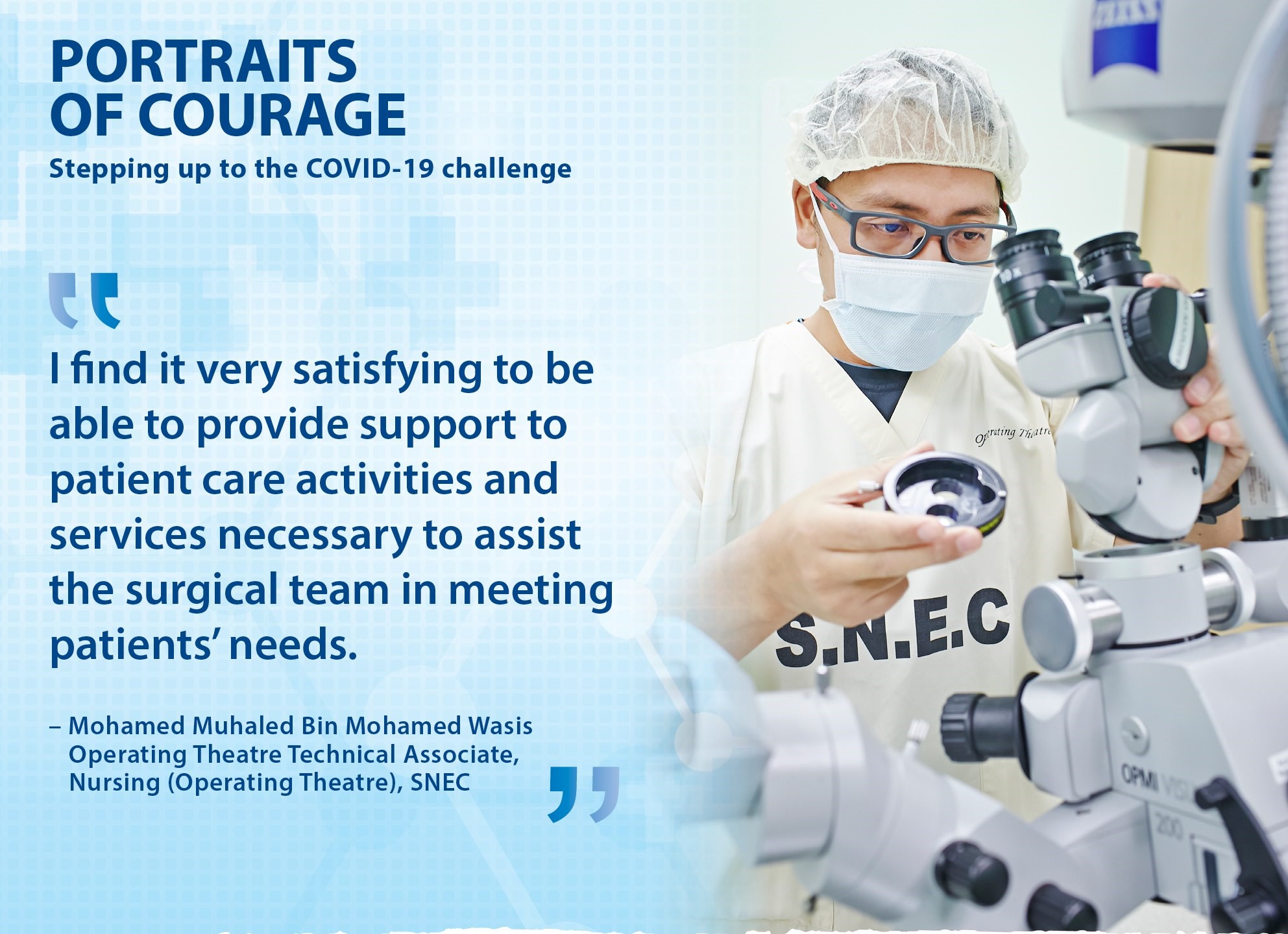
Click here to
read the post.
Portraits of courage: Ong Yew Gin
When friends and family found out that he has been deployed at SGH’s Emergency Department (ED) since 25 March, Ong Yew Gin reveals that many of them were rather concerned. “‘Why there?’ ‘Why you?’ and ‘Don’t they have other staff?’ were some of the questions thrown at me,” he says. His father, though, was much more calm and positive, encouraging him to take this as a challenge and add it to his life experiences.
Yew Gin has been deployed there to augment the manpower required as trained ED staff in SGH are supporting COVID-19 operations nationally. But Yew Gin, who joined SNEC in March 2019, admits that he was “a little scared” when he learnt of his posting — he had only a day’s notice! Not surprisingly, there was a steep learning curve. Not only are his tasks different from that in SNEC, Yew Gin has to cope with a much higher patient load and quicker patient turnaround. He has been assigned to the non-fever area in ED. “My duties include giving medicine, sending patients to ward after admission, discharging patients, and assisting doctors in the consultation room with urine catheters, wound dressings, etc,” he describes. He is usually in a pair of gloves and a N95 mask; that escalates to full PPE when he has to enter the Acute Respiratory Infection area.
Yew Gin’s experience in nursing patients with eye problems has come in handy a number of times at the ED. He once noticed that an elderly lady, who was admitted for stomach pains, did not observe proper hygiene around her eyes, so he stepped in to clean and wash the area. “The daughter of the patient was very thankful,” he shares. “I also taught her step-by-step how to clean her mum’s eyes when she got home.”
Yew Gin is grateful for teammates who have been looking out for him, especially in the early days of his deployment. Besides patiently showing him the ropes, they also included him in the ordering of food and drinks. “The way they have been treating me makes me feel I am truly part of their team.” He is also pleased that they assess him to now be as good as regular Emergency staff. This experience is something Yew Gin treasures, as “not everyone who volunteered was chosen to be deployed”.
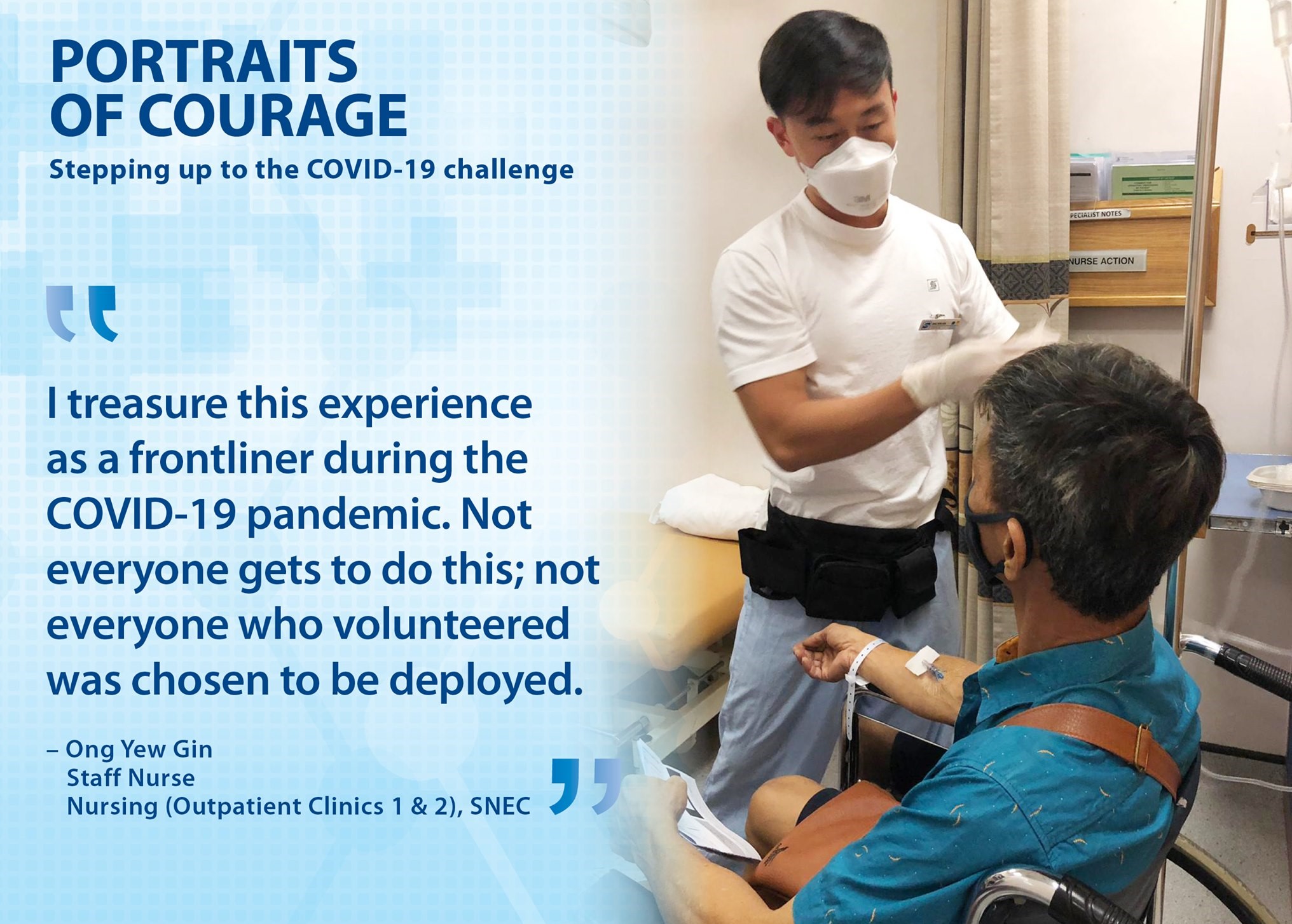
Click here to
read the post.
Portraits of courage: Dr Stanley Poh
Although deployed at the Singapore EXPO Community Care Facility on 12-hour shifts and six-day cycles to look after COVID-positive migrant workers, Dr Stanley Poh does not feel like a fish out of water. This is because many SNEC and SERI colleagues have also stepped up to volunteer. “I particularly enjoy the camaraderie working with people from different departments. Overall, it has been an eye-opening and enriching journey,” he shares.
Despite being in the trenches with familiar faces, the task at hand is still daunting for Dr Poh, especially the first day he stepped into EXPO and came face to face with many patients. He works in the Sick Bay, dealing with common complaints such as chest pains and headaches, and occasionally handles new admissions.
“It is heartwarming to have people with various expertise guiding each other when dealing with more complex cases. We have a cardiologist who offered to guide us and interpret all the ECGs, a few radiologists to read chest x-rays, nurses who are familiar with wound care to take care of wounds, and myself providing some input for eye-related cases from time to time. In order to reduce our exposure to the virus, we communicate with patients via Zoom outside clinic hours,” he reveals. “We will then assess the severity and decide if there’s a need to attend to patients physically in the halls.”
Dr Poh is always conscientious about safety protocols. “We have to be meticulous with infection control measures to ensure safety for everyone. We change into scrubs before a shift, and shower before going home,” he describes. “These meticulous processes, plus the donning of PPE, have protected us.”
When asked why he decided to volunteer, Dr Poh replies, “I felt it was the right thing to do. It has been very encouraging to see many senior doctors and nurses volunteering and taking on this deployment.” Most of Dr Poh’s friends and family are supportive of his volunteer work, and constantly remind him to take good care of himself. He assures them that frontline workers are well taken care of. “The welfare here is nothing short of amazing! We are constantly fed, and even treated to bubble tea and ice cream.”
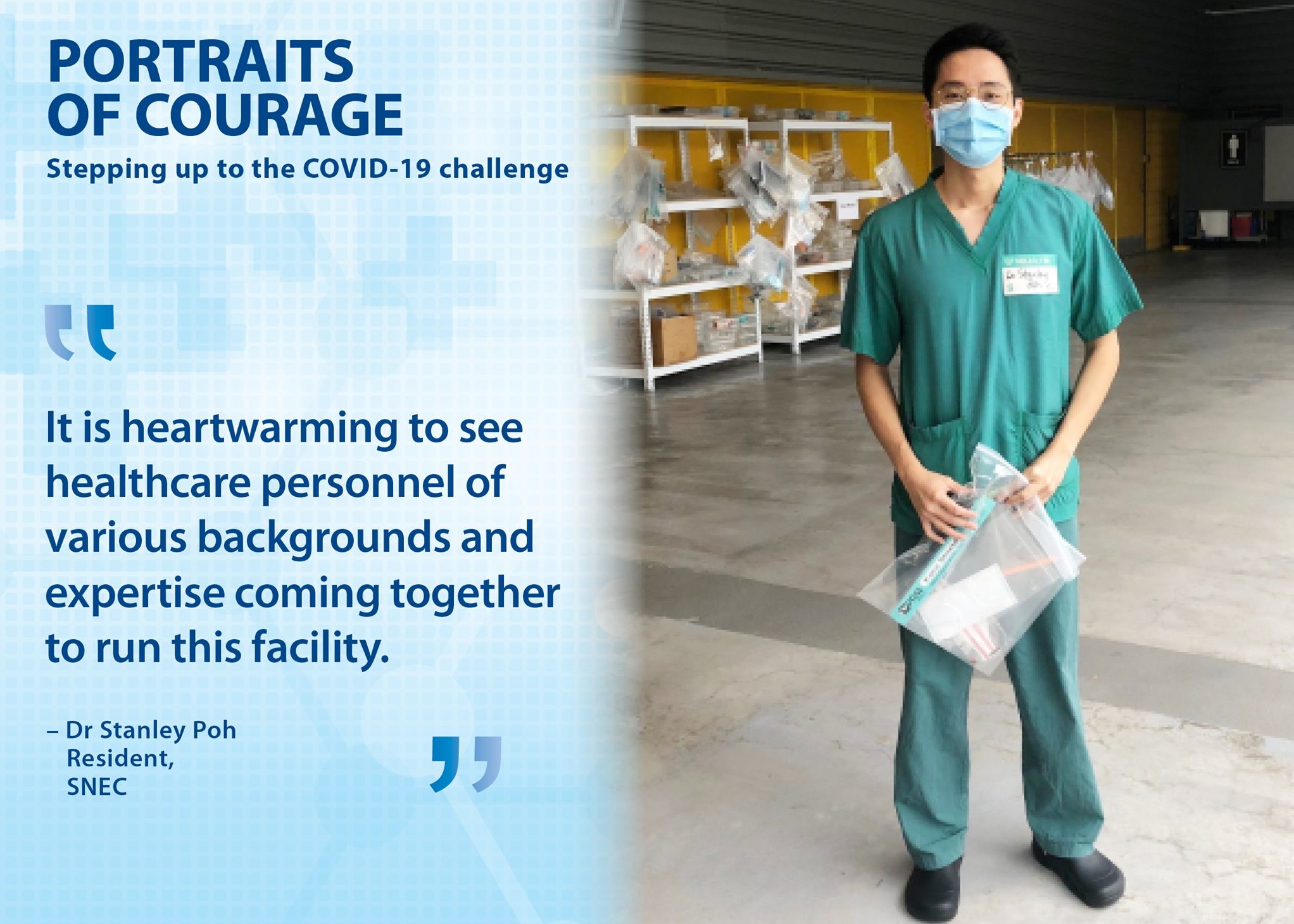
Click here to
read the post.
Portraits of courage: Helen Hua Thi Hoan
“Similar to them, I live far from my family; if I were in their position, I’d feel fearful and lonely,” says Helen Hua, referring to the migrant workers housed in a Swab Isolation Facility (SIF), where she is a volunteer. Helen, who hails from Vietnam, has been working at SNEC for the last 10 years.
Currently an Assistant Manager in Patient Liaison Services, Helen takes care of patients, helping them make appointments with eye doctors, and acting as interpreter for Vietnamese-speaking patients. At the SIF, she is a ground commander. “I coordinate with the security, admin and medical teams to ensure proper security arrangements and infection-control precautions upon the migrant workers’ arrival and departure,” she clarifies. Her day usually starts at 8am and ends at about 7pm, depending on the conveyance schedule. She was part of the team that set up the SIF. “We had to set up everything from Day 1.”
Helen shares that the migrant workers are isolated at the SIF while awaiting their swab results. Those who are clinically unwell are sent to hospitals for further assessment and treatment. She also reveals that many of them arrived from their dorms bringing little; some may have a backpack or plastic bag of personal belongings. “We empathise with them as they are far from home and anxious about their condition. Most of them are worried; the first question they often ask is ‘am I positive?’”
Understandably, Helen has her concerns when she started her deployment in early May. “But I realised that if we observe proper personal and hand hygiene, and wear full PPE (personal protective equipment) correctly, we are protected.” Speaking of PPE, she says it is quite uncomfortable to wear. “You can see everyone sweating and ‘swimming’ inside their PPE!” Despite the challenges of her deployment, Helen relishes being out of her comfort zone, and appreciates the high level of teamwork displayed by staff from different SingHealth institutions.

Click here to
read the post.
Portraits of courage: Victor Yong
Although deployed around mid-May at the Department of Laboratory Medicine (DLM), Tan Tock Seng Hospital (TTSH), to aid in the national effort to contain COVID-19, it is not all-out testing from the moment Victor Yong steps into the lab. During down times, especially in the mornings, the Research Officer with the Ocular Genomics Research Group in SERI has to conduct routine maintenance, “such as disinfecting the biosafety cabinet hoods, preparing the extraction machines, and generally getting things ready for the day”.
The rush comes in the afternoon, when samples collected by the polyclinics and external sites reach DLM. Staff are split into three shifts, and must don N95 masks and disposable gowns to protect themselves. “No, we don’t wear spacesuits with helmets and ventilators on our backs,” Victor explains. Another misconception is the CSI effect — the popular TV series often showed samples requiring only 10 seconds to process, and solutions are found within a 40-minute episode. “In reality, there’s a lot of manual work involved, and even machines take time. It takes slightly more than three hours from start to finish.”
When asked how friends and family are responding to the news of his deployment, Victor shares that most friends have expressed concern and advised him to take extra care of himself. “My parents are proud and worried in equal measures,” he adds; after all, Victor’s sister, who works in an eye hospital in the UK, has also been activated to treat COVID-19 patients. He is also pleased to have a supportive landlord — “so I don’t need alternative accommodation,” he quips.
While he praises his team for always being willing to pitch in, and a trainer who has been patient in showing him the ropes, the greatest morale booster for Victor is seeing negative results. “That means people are recovering and going home — and that’s good news!”
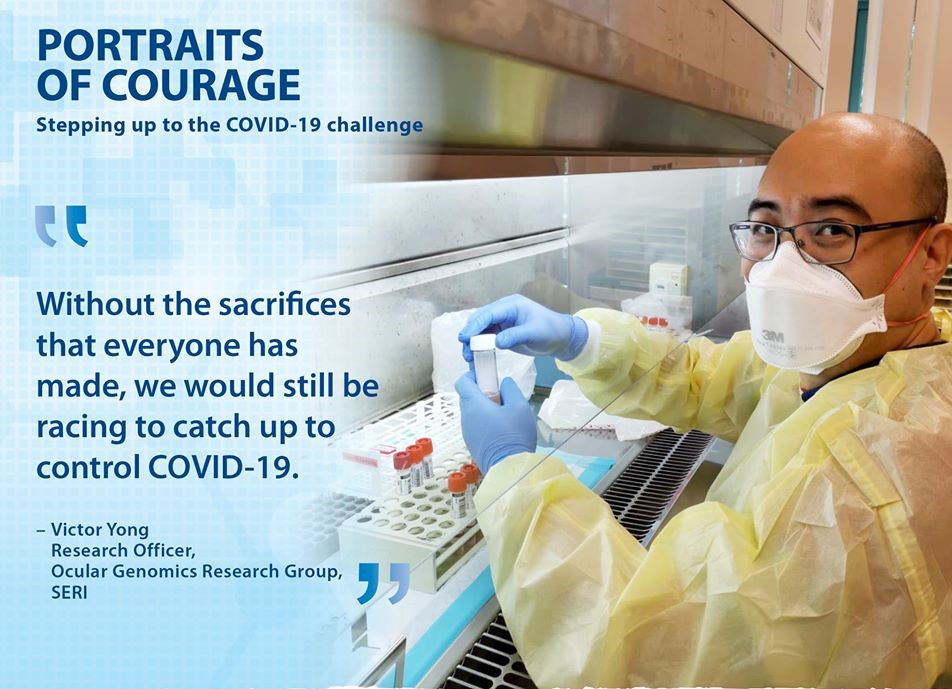
Click here to
read the post.
Portraits of courage: Muhammad Nur Bin Wagiyoh
Muhammad Nur Bin Wagiyoh is a Facilities Manager with ISS, a global leader in facility services and a long-time partner of SNEC’s Operations & Facility department. He has been attached to SNEC for the past six years, and is one of our many unseen heroes who has stepped up his game to combat COVID-19.
Muhammad and his team of 10 are responsible for the maintenance of the SNEC building: electrical, aircon, plumbing and building. “We are the first line of response if anything goes awry,” he explains. Since the onset of COVID-19 in Singapore, they have had to shoulder additional duties and work overtime, be it weekday or weekend.
One of these was implementing various safe-distancing measures: marking the floors and spacing out seats to guide patients to maintain a safe distance from one another, putting up signs and protective table dividers at staff pantries. Another was the setting up of thermal scanners to screen patients and visitors before they enter SNEC. And to protect patients and staff during this pandemic, they have worked to restrict entrances to the centre “so that there are only two entry and exit points”.
Muhammad has had to get used to the many aspects of the “new normal”, such as team meetings on Zoom, mask wearing, and the sanitising of hands after a job. In fact, he always reminds his team, “Every time you touch a surface, you sanitise.” In this respect, he shares that SNEC has added many sanitiser points at high-touch areas to reduce transmission of the coronavirus.
Muhammad and his team work mostly behind the scenes, which suits him just fine. “I’m the kind of person who likes to contribute without people noticing.” He is proud that they have shown initiative during this difficult time, proposing many ideas to achieve safe distancing. However, he admits it has been a challenge getting some patients and visitors to adhere to these protocols. “I hope they can understand the importance of such measures and be cooperative, as we want to keep them safe.”

Click here to
read the post.
Portraits of courage: Assoc Prof Ian Yeo
“‘Why did you volunteer?’ is a question I get asked all the time,” reveals Assoc Prof Ian Yeo. He stepped forward to be deployed in the national effort to combat the COVID-19 virus, and is the senior doctor of one of the medical teams stationed at Singapore EXPO, which has been converted into a Community Care Facility.
“I was inspired to see so many frontline healthcare workers risk their lives caring for COVID-19 cases while I was in the relative safety of working in SNEC,” Assoc Prof Yeo shares. He thus decided to chip in at the frontline. “More hands make light work for all,” he remarks.
Assoc Prof Yeo says there is great camaraderie among the healthcare workers —including many SNEC colleagues — at EXPO. “Although we all come from different medical disciplines and seniority, there is no hierarchy as we work, with everyone watching out for each other,” he describes. “I am humbled by the teamwork and help given to me, having been away from primary care for such a long time.”
This kind of support is surely a blessing for the work at EXPO, including 12-hour shifts and the need to wear full PPE. “It’s like taking a sauna daily,” Assoc Prof Yeo says. “That’s why we limit staff to wear full PPE for no more than two hours at a time to prevent dehydration and fatigue.” His team’s role is to monitor the health of all residents at the CCF, manage new symptoms and existing chronic conditions, and send those who have worsening symptoms back to the hospitals for further clinical management and support.
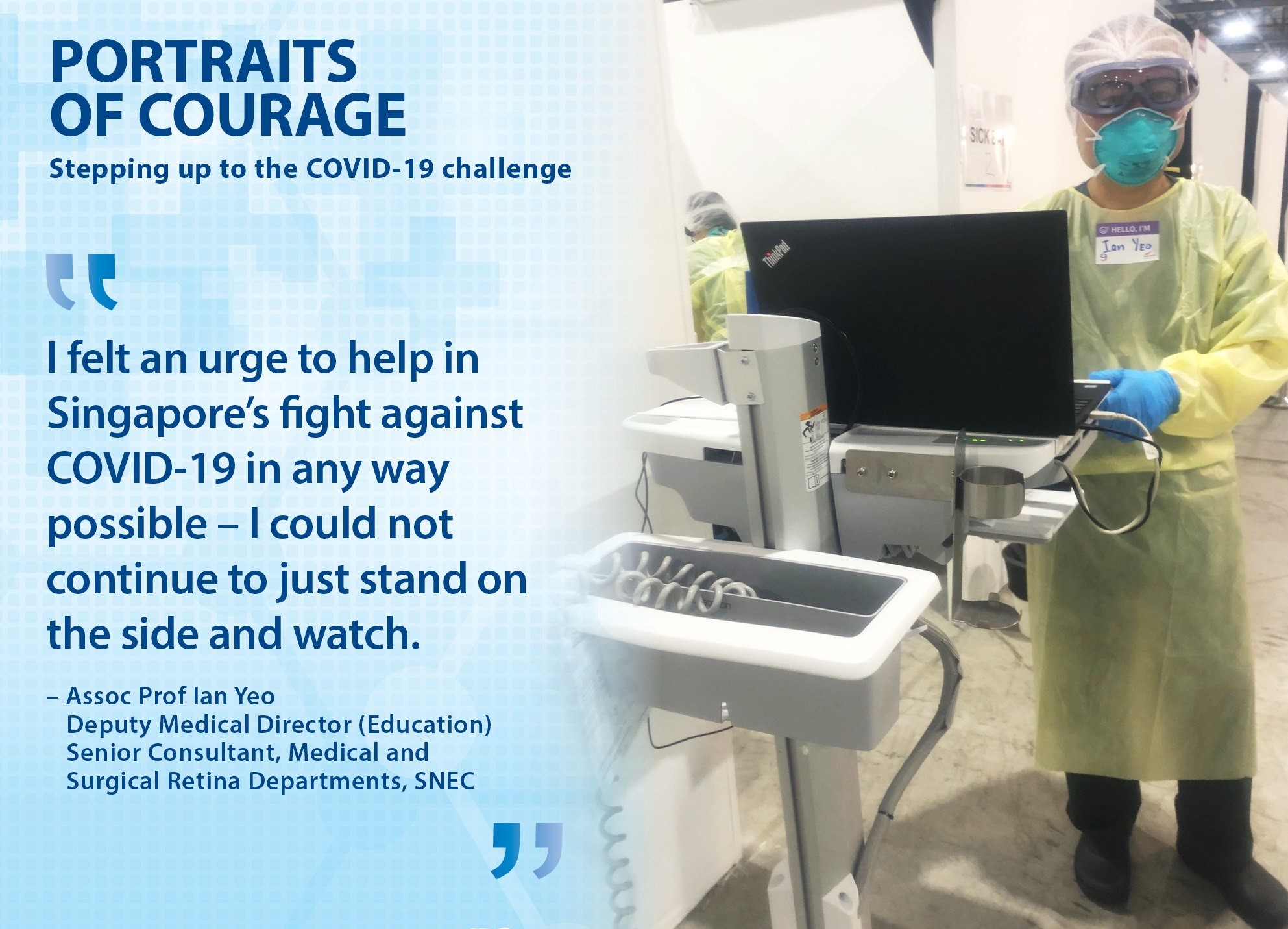
Click here to
read the post.
Portraits of courage: Thng Poh Geok
When Singapore’s healthcare system pivoted towards tackling the COVID-19 situation, Thng Poh Geok’s workload was not really affected. “It was more a change in the scope of duties,” says the Senior Healthcare Attendant at SNEC’s clinic in Sengkang General Hospital, where she has been employed for more than two years. Prior to this, she had worked at SNEC in the SGH campus for 15 years.
“My role is patient-facing, helping them scan their IC or appointment card. These days, I also assist with patient declaration forms, which includes collecting information on travel and symptoms,” explains Poh Geok. Besides helping to direct patients to isolation rooms for quarantining, “sometimes I also cover dispatch duties when the clinic is short-handed”.
Due to the COVID-19 pandemic, Poh Geok is more aware about its safety protocols. She routinely cleans and disinfects tables, computers, consultation rooms, and high-touch surfaces, and diligently practises safe distancing and hand washing. She habitually wears a mask every day, from the time she leaves her home until she returns home, removing it only at mealtimes. One reason she is so conscientious about these protocols is because her husband, who resides in a nursing home, is part of the demographic most vulnerable to the virus.
Poh Geok’s children — she has two sons and one daughter — have been checking in on her every day since the shift in her scope of duties. “My family always tells me to be safe, eat well and stay healthy,” she adds with a smile. She sends them a photo of herself whenever she is on duty. “When I forget to send, they will start sending me WhatsApp voice messages!”
She has one piece of advice for everyone during this period: “Remember to wear a mask whenever you leave your house! Don’t go without it, except only during mealtimes!”
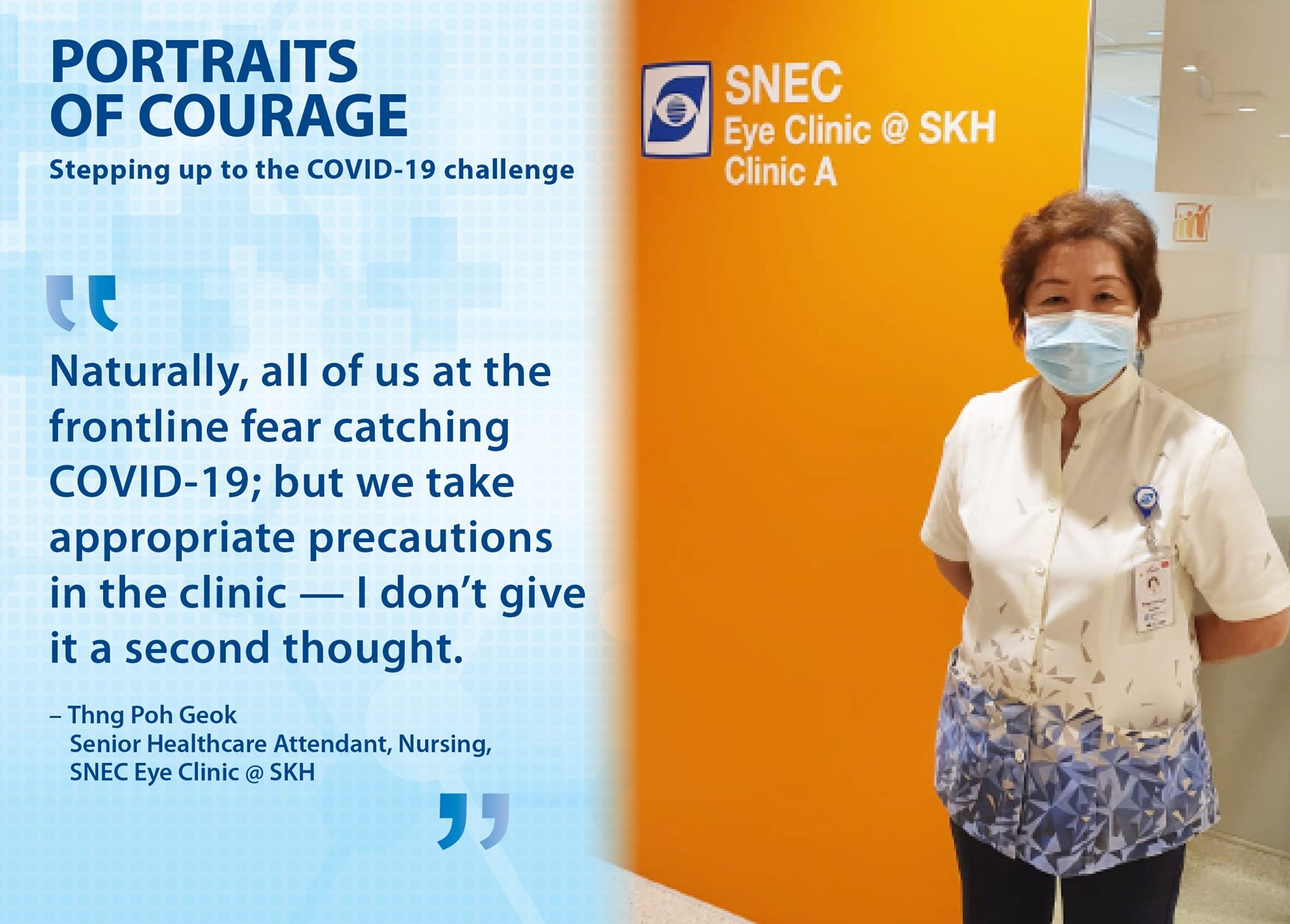
Click here to
read the post.
Portraits of courage: Dr Daniel Ting
It could be said that the COVID-19 pandemic helped to reunite Dr Daniel Ting with his wife and three-year-old child. The consultant with SNEC’s surgical retina department had to return to Singapore three months early from a year-long work attachment in London, UK, as his expertise was needed.
In fact, soon after arriving home, Dr Ting was invited to join the research and innovation taskforce committee of the Community Care Facility (CCF) @ Singapore EXPO. His role would be to evaluate and implement digital technology to contain the virus here, using his knowledge and experience as Head of Artificial Intelligence and Digital Technology in SERI. “I felt extremely blessed to return early and be given the opportunity to serve,” he says.
However, Dr Ting faced several hurdles, the biggest of which was the language barrier. “More than 50% of the migrant workers housed in EXPO are non-English speaking— it was difficult for effective clinical documentation and routine communication on the ground,” he explains.
To overcome this barrier, Dr Ting had to conduct multiple late-night meetings and on-site recces to ensure that the technologies tested were working optimally while soaked in sweat under his PPE — but both conditions were things he was more than willing to endure. “Without going to the ground to understand their clinical and operational workflow, it would not be possible to figure out the best way of deploying these technologies.”
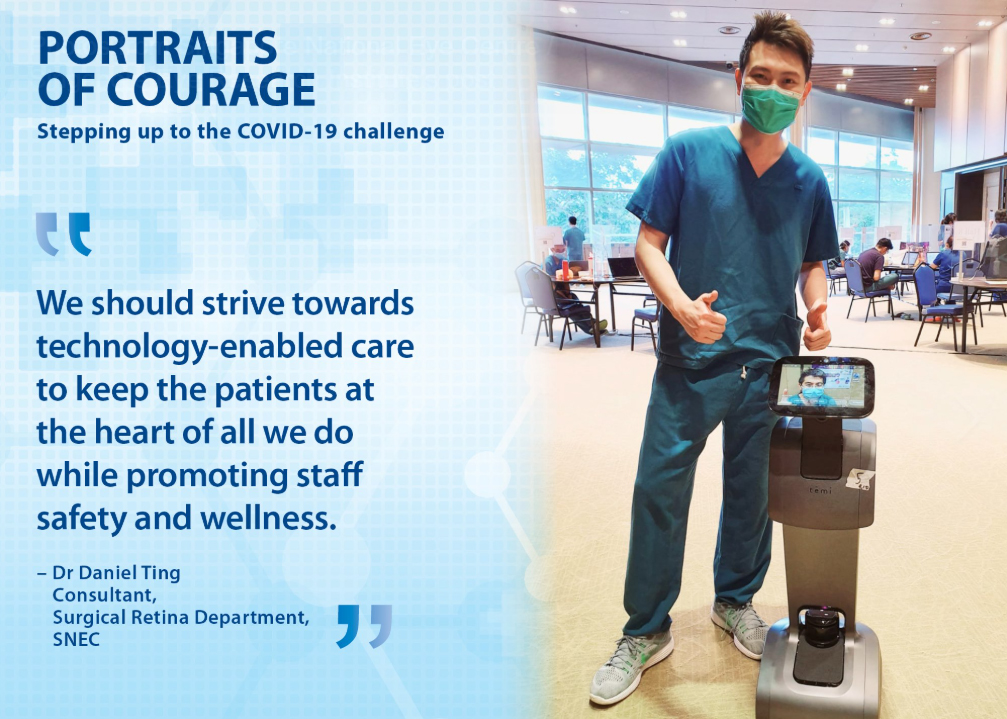
Click here to
read the post.
Portraits of courage: Lim Mun Ching
After responding to a call for volunteers when COVID-19 struck Singapore, Lim Mun Ching, a Senior Optometrist with SNEC’s Optometry Service, received a call from her HR manager. “She asked whether I would be comfortable to volunteer at the Singapore EXPO Community Care Facility as part of the logistics and operations team. I agreed immediately as I was keen to support our heroes on the frontline,” she enthuses.
Mun Ching has since been deployed to support D’Resort @ Downtown East for one week, and is currently back at Singapore EXPO. She wears several hats wherever she is deployed, such as catering meals, setting up and maintaining inventory, and ensuring environmental cleanliness. The toughest task she faced was starting out at the EXPO, working with fellow volunteers to support frontline colleagues running the four halls managed by SingHealth. “When we first went in, there was nothing,” she recalls. “The team started from scratch — empty stores, a couple of tables, and limited shower facilities.” Her team helped to prep certain spaces within EXPO “so that they are conducive for staff to work and rest”. She easily clocked 12-hour days then.
When family and friends learnt of Mun Ching’s volunteer work, they were encouraging, yet concerned. “I allayed their anxiety by saying that I have no direct contact with patients, and that I wear an N95 mask all the time. I also promised to regularly keep them apprised of my situation,” she says. She also assured them that she will make time to exercise and eat right to boost her immunity.
While it has been a steep learning curve, Mun Ching appreciated the eye-opening experience. Firstly, she is getting a first-hand look at how back-end operations work. “My fellow volunteers from back-end ops are very effective and efficient — they know what to do, how to get things done at the snap of a finger. I had the benefit of learning from and working alongside these unseen heroes.” Secondly, while the evolving COVID-19 situation has forced everyone to adapt to new norms, the pandemic has made her realise essential constants: “I am reminded of the importance of social responsibility and connecting with each other. We need one another to live healthy and meaningful lives. Let’s continue to do the right thing, not just for you and me, but for our families and friends.”
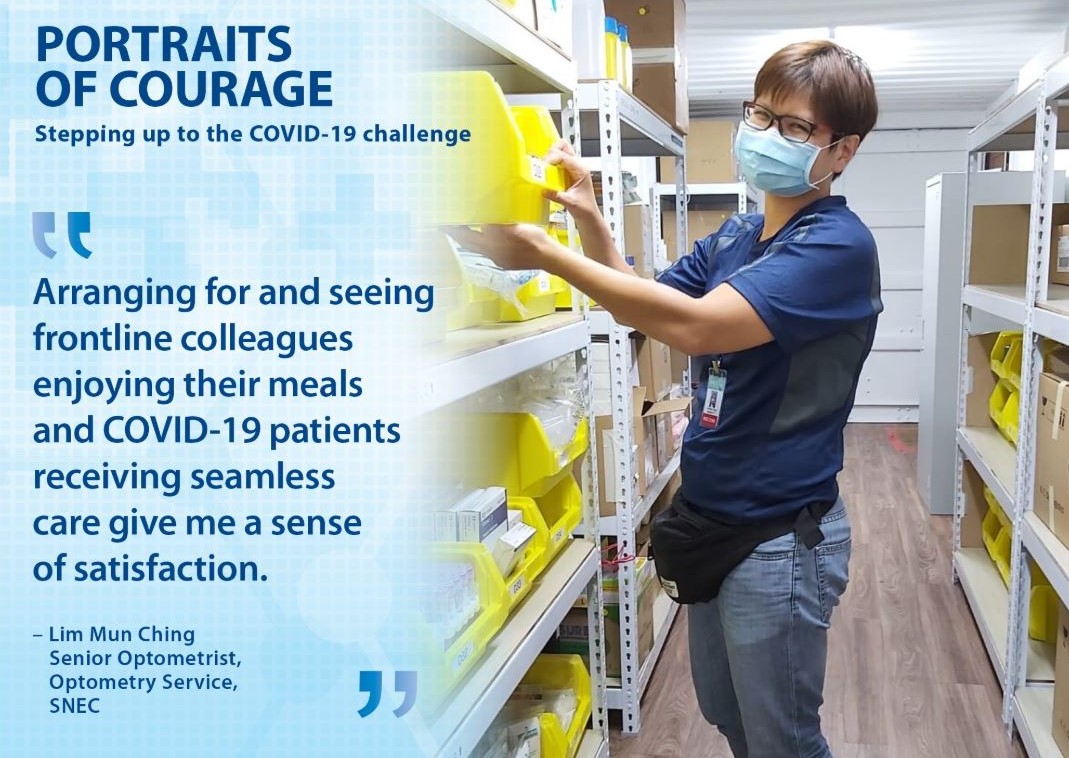
Click here to
read the post.
Portraits of courage: Loh Huey Peng
When she was asked to volunteer in the nation’s effort to contain COVID-19, Loh Huey Peng agreed without hesitation. The Director of Nursing at SNEC accepted the Nursing Lead role at Singapore EXPO when it was converted into a Community Care Facility for patients with mild symptoms.
Huey Peng worked 12-hour shifts in the initial weeks of her deployment. “I had to be on-site to understand the workflow in order to assess clinical needs, then set up SOPs to ensure the safety of staff and residents,” she explains. Knowing her risk of contracting and spreading the virus to her family, Huey Peng has taken steps to minimise that from happening. “I have set up SOPs for my home to protect my family and keep myself well through adequate rest and hydration.”
To stay effective on the frontline, Huey Peng has developed strategies to cope. Because she is working outside her comfort zone, she crowd-sources the domain knowledge of teammates in order to come up with solutions. She also advocates decisive actions instead of overanalysing things. “We are challenged by new issues and new circumstances on a daily basis,” she warns. “Until we take action and resolve these issues, they will only be hypotheticals.” She is also prepared to course-correct along the way. “As a leader, I will admit my mistakes and look for better ways to overcome challenges,” she says.
Huey Peng is grateful for this opportunity to help the country, as it has reinforced what she has long held dear. “People are our greatest asset,” she shares. “Learn to value and connect with them. The effects can be tremendous if leaders give them a voice to speak up.”
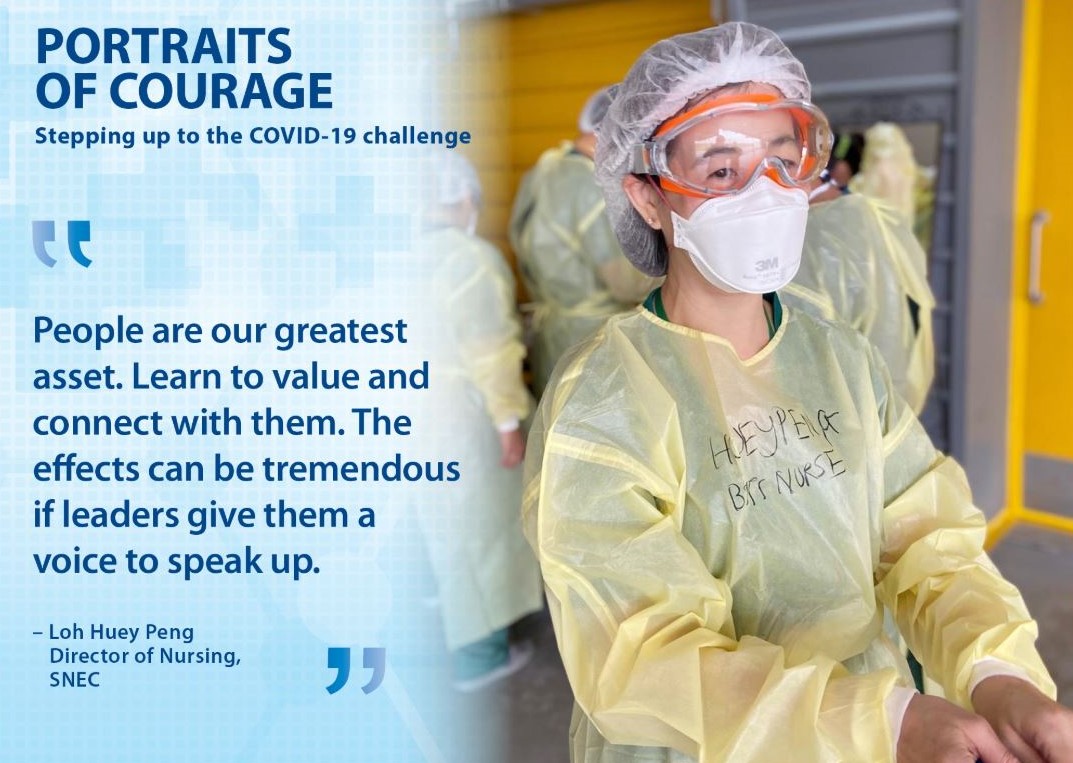
Click here to
read the post.
Portraits of courage: Adj Assoc Prof Mohamad Rosman
Working right on the COVID-19 frontline is Adj Assoc Prof Mohamad Rosman. The head and senior consultant of SNEC’s Refractive Surgery Department is also a Dorm Medical Officer overseeing the medical teams at migrant worker dorms assigned to SingHealth. “I visit the dorm to make sure the medical posts and swabbing exercises are running smoothly,” he says.
Adj Assoc Prof Rosman explains that each medical team consists of eight to nine people, including doctors, nurses and admin staff. His role is to look after their welfare and to anticipate and resolve coordination issues with other stakeholders. “It is also my duty to work closely with the dorm operators and FAST to ensure there’s continuity of care and clear communications to the migrant workers,” he adds. Other than a short visit to Singapore EXPO — which has been converted into a Community Care Facility for patients with mild symptoms— to understand how things are run, “everything else was learnt on the job”.
What helped Adj Assoc Prof Rosman cope was his previous career as a regular with the SAF. As a medical officer, he had not only lived through outbreaks of SARS and H1N1, but had also gone on numerous humanitarian missions, “so I have the relevant experience and that’s why they enlisted my help”. Not mincing his words, he describes the COVID-19 pandemic as a war-like situation. “I have a first-hand view of the situation on the ground,” he shares. “People generally think that, since the Circuit Breaker has been lifted, things must be much better — but we know that the war against COVID is not yet over.”
Adj Assoc Prof Rosman accepts that there will be challenges in his new role, and is alert to its inherent dangers. “It is true that it is risky at the dorms,” he says, and admits that he worries about catching the virus and passing it on to his wife and two children. Still, Adj Assoc Prof Rosman believes that what he is doing is important. “If my effort can help the situation improve, it is worth the sacrifice I’m making.”
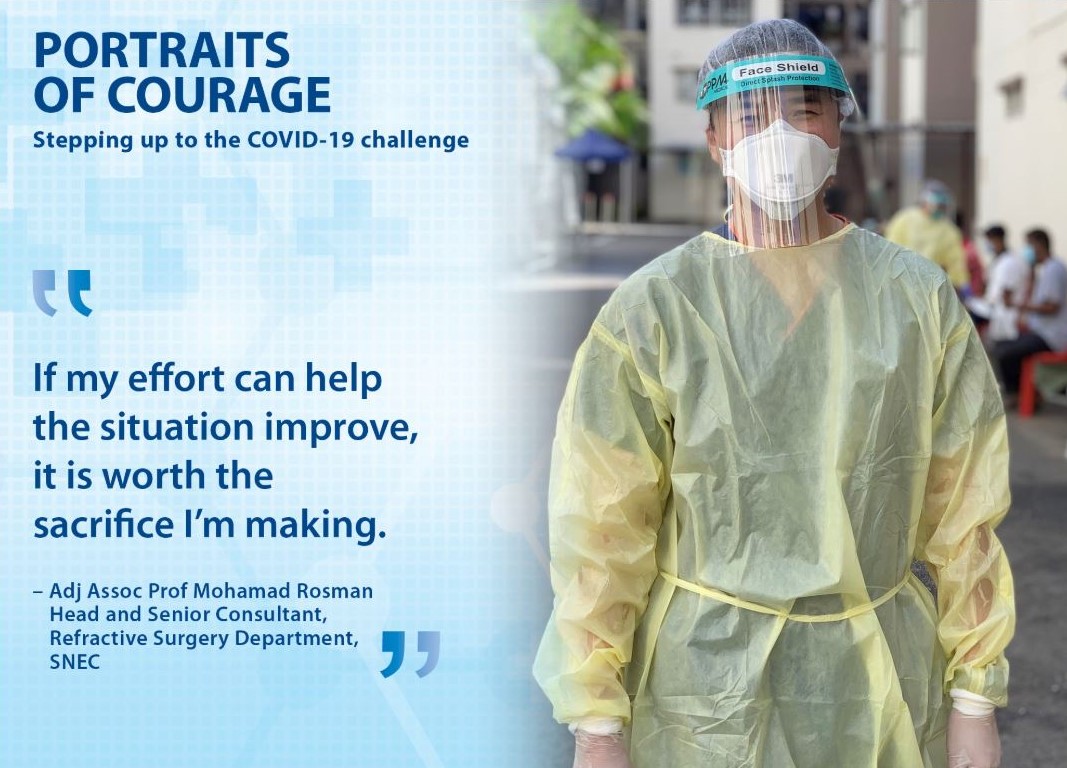
Click here to
read the post.
Portraits of courage: Angeline Ng
When Singapore entered DORSCON orange, “patients began to panic, calling in to change their appointments”, recalls Angeline Ng, Senior Appointment Assistant, Call Centre. The situation worsened when the Circuit Breaker started: her team had to deal with a surge in calls, mostly enquiries on re-scheduling appointments. Although she is spending more time explaining new policies to callers, and coordinating between patients and relevant departments, she is grateful for a large number of understanding patients. “Some of them start the call quite aggressively, but they end with ‘take care’, ‘stay safe’, or ‘we know you’re having a hard time’. These little words are really encouraging!”
Because of COVID-19, our Call Centre’s call back service has been implemented to work daily to cope with the new normal of a greater influx of calls. This service used to be in effect only on Mondays, and during periods of high call volume. “Taking overflow calls has resulted in shorter waiting times for patients to be connected to a call agent. All team members stay back for an hour or two to clear outstanding cases within the same day.” Concurrently, Angeline is training new staff who joined SNEC in April 2020 — “we sit at least 1 metre apart, of course!” In addition, there are after-hours team huddles so that the Call Centre Manager can update them on new directives and protocols that they need to convey to callers.
Angeline’s biggest challenge is probably convincing patients to stick to their re-scheduled appointments, unless their condition deteriorates drastically. In such urgent cases, “we advise them to walk in to our Acute Care Clinic or SGH’s Emergency department”.
Angeline, who has been with SNEC since 2016, does not mind the extra workload, and she is aware that her contributions support colleagues on the frontlines of the effort to contain and eradicate the COVID-19 virus. “We must cope with the high volume of calls and just manage it. This is not much compared to those frontliners, who are exposing themselves to the virus.” Having supportive colleagues helps. “We take turns to buy bubble tea to de-stress, while our manager orders food whenever we work overtime,” she shares.
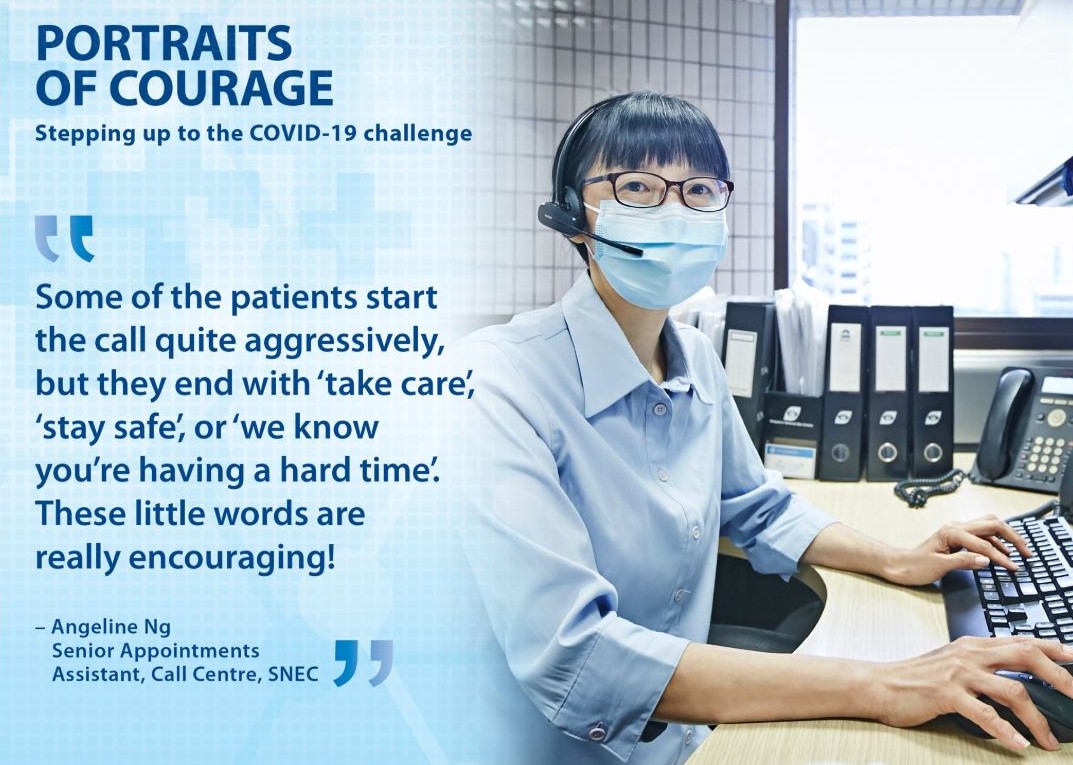
Click here to
read the post.
Portraits of courage: Ganchalee Sae Gan
By the time you read this, Ganchalee Sae Gan, a Senior Staff Nurse in SNEC’s Day Ward, would have finished her deployment to tackle the COVID-19 pandemic, and be back on duty at SNEC, which she joined two-and-a-half years ago. She was attached to the Fever Screening Area (FSA) and SGH’s Emergency department.
The scope of Ganchalee’s duties during her deployment was a far cry from her regular duties at SNEC, which includes preparing patients for operations, and giving pre- and post- operation advice to patients. “I had previous experience in the Department of Emergency Medicine, so I was prepared to be deployed to FSA,” she reveals. But she was thrown off by the workload during the early stages of the pandemic. “We sometimes had to work through lunch and tea break.”
FSA is the first touch point for suspected cases, where patients are screened for fever and other flu-like symptoms. “All of them are examined by doctors and will undergo a chest X-ray and throat swab,” Ganchalee explains. At the Emergency department, her duties included making calls to doctors to confirm patient outcomes. One of her toughest jobs was informing patients, especially the migrant workers, that they have tested positive. “We must be very calm in front of them; we can’t show our fear, if not they get more fearful!”
Ganchalee lives in a household of 10 people, including her parents and two daughters, aged six and nine. Living with people who are more vulnerable to the COVID-19 virus, she is keenly aware of the safety protocols she must adhere to. Before her deployment, she assured her family that she would shower at work after a shift, and again after reaching home. “We strictly followed guidelines and wore PPE, whether we were encountering confirmed cases or suspected cases,” she affirms. Ganchalee has a message for fellow Singaporeans: “Please stay at home and only go out for essential needs. It may seem difficult, but this is the best time to build bonds with family and loved ones, so treasure it!”
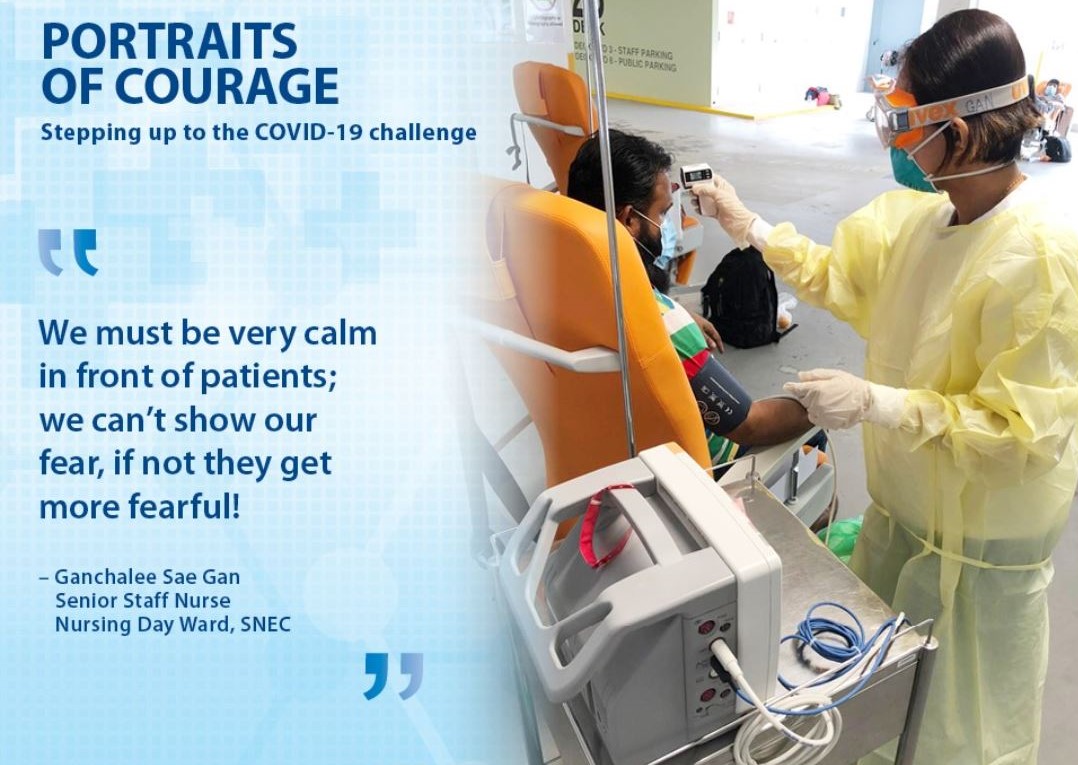
Click here to
read the post.
Portraits of courage: Cindy Tan
“To me, it’s a job that needs to be done, and it’s something we ought to do, even though we’re not at full strength.” This is how deeply Cindy Tan cares about fulfilling her duty as Senior Associate Executive in Quality Service and Office of Patient Experience, especially in these COVID-19 times, when colleagues are often deployed to external operations, including the dormitories and community care facilities such as the Singapore EXPO, thus disrupting work routines and patient schedules. In handling all kinds of patient feedback, Cindy and her team are keenly aware that patients have been extra sensitive during the pandemic. “We empathise with them as they are frustrated about the important processes that we have implemented in the centre,” she shares. “We will go to the clinic to speak to the patients — in surgical mask, and maintain safe distancing, of course. There, we will explain how we can resolve their problems, such as scheduling another doctor should their regular one be on duty at the dormitories.” Cindy also helps to allay their anxiety about their eye condition, and gets advice from doctors on symptoms to look out for as well as preventative methods. “We work really hard to look for solutions and alternatives, but also advise them that there are health and safety guidelines that restrict what we can do to meet their expectations.” Because of COVID-19, staggered hours, safe distancing, online meetings, and disinfecting her desk are now second nature to Cindy. She is unable to work from home because Repeat Prescription requires her to physically coordinate with the Call Centre, Pharmacy, and Medical Officer. But the big challenge she faces “is the need to keep myself motivated, especially when handling negative feedback, and patients or their caregivers who refuse to accept my explanations”. She adds, “I just remain positive and get the job done alongside my dedicated team.” Cindy is thankful for observant colleagues and supervisors — who can tell from her body language that she is feeling burnt out — for sharing snacks and advising her to take a break.
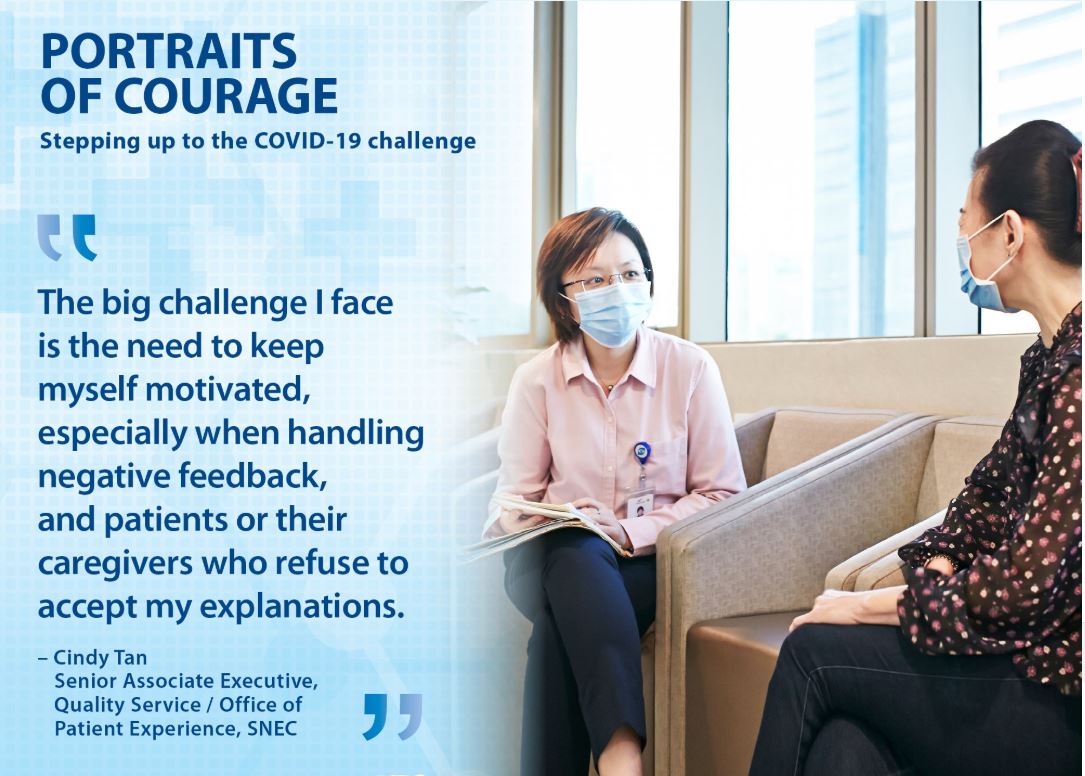
Click here to
read the post.
Portraits of courage: Arumugam Kalyrani
Senior Enrolled Operating Theatre Nurse Arumugam Kalyrani, better known as Kala, is a 25-year veteran of SNEC. “My job in the OT is to circulate and help the anaesthetist,” she explains. While friends and relatives support her calling to be a nurse, they have been expressing serious concerns for her ever since COVID-19 appeared in Singapore. And these concerns have grown louder after Kala recently volunteered to be deployed at the Singapore Expo, which is now serving as an isolation facility for COVID-19 patients. Kala fully appreciates the sentiments of loved ones, and assures them that full PPE is available to her anytime it is called for. Besides helpful teammates, she is also thankful for a caring management that regularly updates them on the changing COVID-19 situation as well as the evolving best practices that frontline healthcare workers need to follow. “What I find most challenging is familiarising myself with the constantly changing measures to curb the progress of the COVID-19 virus.” But before her deployment at the Singapore Expo, Kala had already stepped up her game, although in an unusual way: unprompted, she opened her home to a few Malaysian colleagues residing in Johor Bahru when their country’s lockdown prevented them from making the daily commute across the Causeway. “When the lockdown was announced, I saw them agonising whether to remain in Singapore or head back to Johor Bahru,” Kala shares. “But securing accommodation in Singapore means that they won’t be able to make ends meet.” Since she lives alone and has room to spare, she decided to let them stay with her until travel restrictions are lifted. She even foots the grocery bills. “As colleagues, we should help one another, especially in times of need,” she affirms.
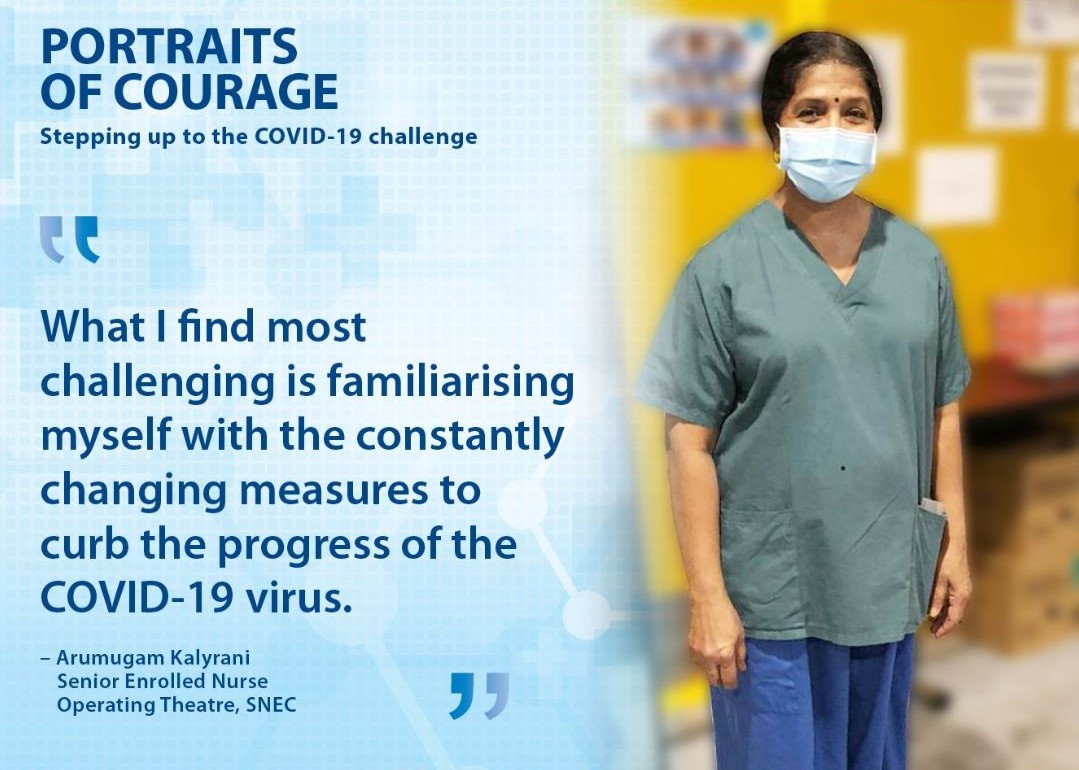
Click here to
read the post.
Portraits of courage: Calista Chua
Medical Social Worker Calista Chua and her colleagues have been facing a more intense work environment during this period of COVID-19. “We have observed a significant increase in referrals to our Medical Social Work (MSW) department,” she shares. Patients are also “more anxious and frustrated as they grieve over the loss of finances and freedom”. But it is far more than just a surge in patient numbers to MSW. “Some of us have been pooled with other social workers and counsellors to man the COVID-19 National CARE Hotline, a helpline set up to provide emotional support to those who need it during the COVID-19 crisis.” To better respond to patient needs, Calista and her team have compiled a list of resources, both financial and in-kind, such as meal support and hotlines for emotional and psychological support. They have also been liaising with internal departments, MSW departments in other institutions, and MOH to streamline all their processes. To allay the fears of friends and family, Calista has to constantly assure them that additional precautions have been implemented at work. Besides staggered lunch breaks, “we have also been diligently sanitising our workstations before and after a session with patients, and before we hand over the room to another colleague”. She admits that her family still worries about her catching the virus since she is travelling to and from a healthcare institution. Despite these difficult times, Calista’s care and concern for her patients still shine through. “Face-to-face contact is important in our line of work. But it is no longer something we easily have today, and I really miss that,” she says. Calista is glad for supportive colleagues, who never fail to encourage each other, often with snacks and beverages. “These have been great sources of stress-relief!”
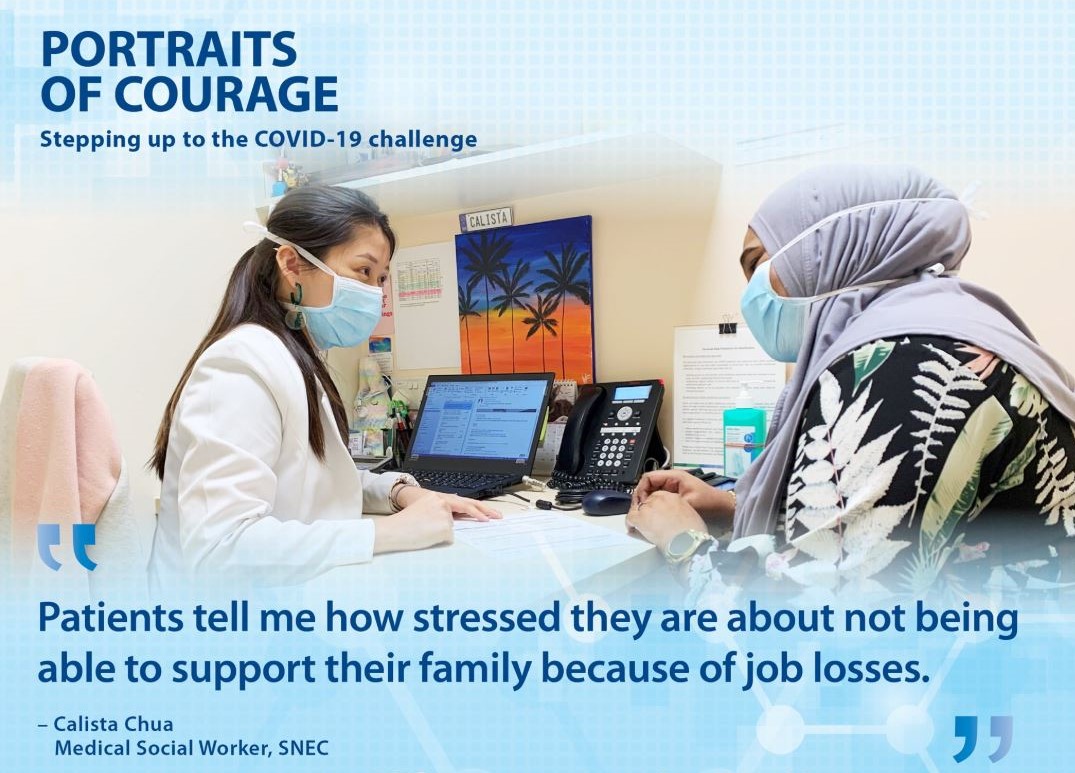
Click here to
read the post.
Portraits of courage: Mohamed Kahir Bin Abu Bakar
Mohamed Kahir Bin Abu Bakar is a Projects Executive with ISS, a global leader in facility services and a long-time partner of SNEC’s Operations & Facility department. Attached to SNEC for the past 25 years, he is part of our army of support staff who have stepped up their duties and responsibilities to more effectively contain COVID-19.
In charge of housekeeping within SNEC, Kahir supervises a team of 25 cleaners. The team has been tirelessly managing the logistics ever since COVID-19 struck, helping to shift tables, remove chairs, and set up new triage areas. Having lived and worked through SARS, Kahir has used that experience to establish protocols with respect to the pandemic, such as increasing the cleaning frequency, and putting up additional sanitiser touch points around SNEC.
Although Kahir has made certain that all members of his team understand the importance of wearing PPE while going about their duties, he worries about them constantly. “Most of them are in their 50s and 60s — very vulnerable to COVID-19! That’s why I brief them daily now instead of once a week to ensure their safety,” he says. He is also aware of safety protocols, and will advise patients — especially the ‘aunties’ and ‘uncles’ — as and when the need arises. “I speak a bit of Hokkien, so that helps,” he quips.
Kahir is proud that he and his team are able to provide such an essential service in these difficult times. “What we do may be invisible and mundane, but we do it so that the Centre can be safe for patients and staff,” he stresses.
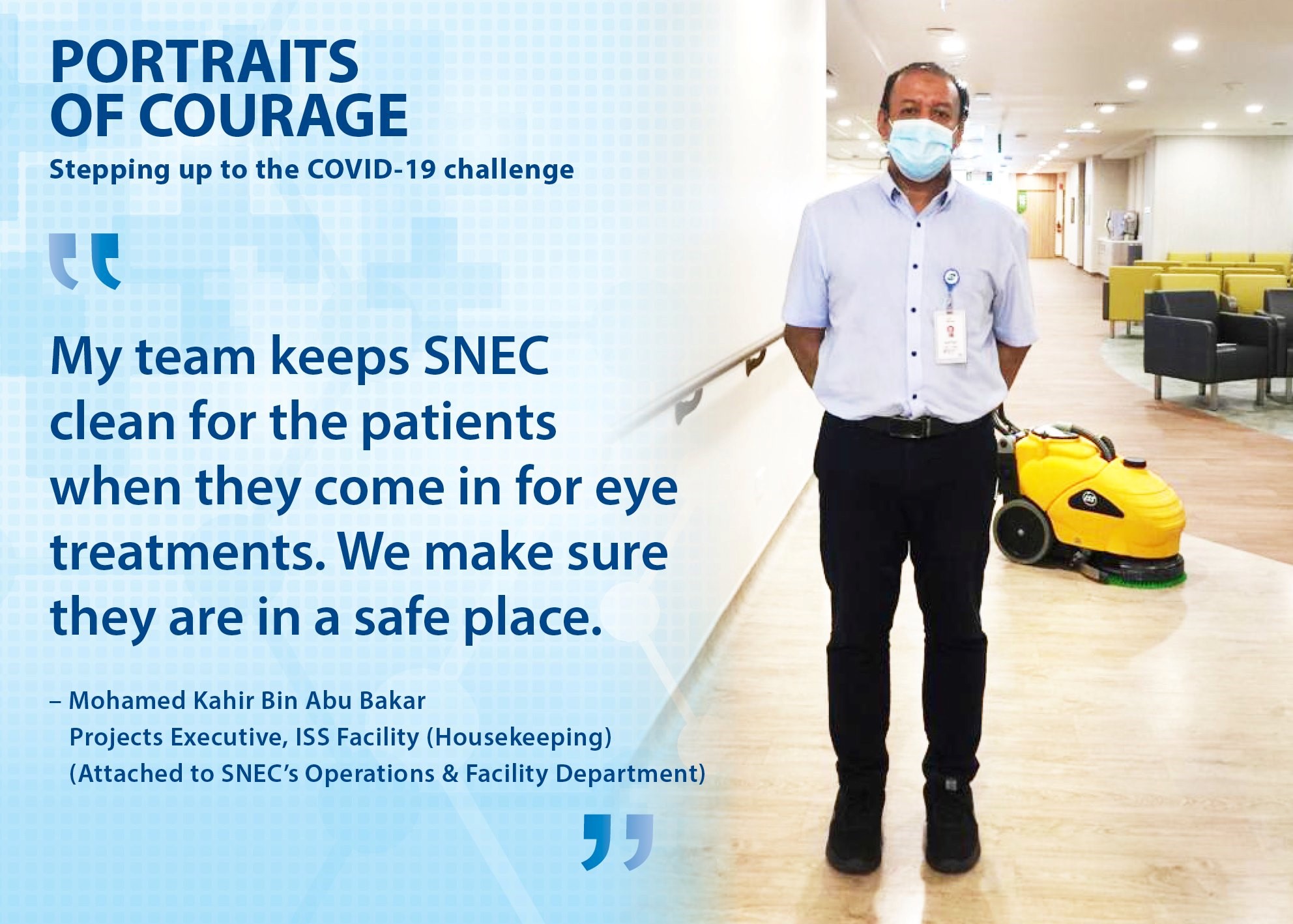
Click here to
read the post.
Portraits of courage: Ong Chu Ting
As an operating theatre staff nurse at SNEC for about two years, one of Ong Chu Ting’s main duties is assisting surgeons in the operating theatre. But when COVID-19 arrived on our shores, she recently volunteered to be deployed in the A&E department of SGH as part of our team of medical professionals who have stepped up to contain the virus.
“For the whole of my first day there, I mostly stayed out of the way to observe, initiating help to the staff where it was needed. There was a quick tour of the A&E department on Day 2; everything else was learnt on the job!” At SGH, Chu Ting’s daily routine includes carrying out doctors’ orders, such as giving IV drips and injections, and dispensing medicine; providing patient care, such as taking vital signs regularly and helping non-ambulant patients move around; and admin protocols, such as admission and discharge procedures and assigning of beds.
Although her friends and family continuously worry about her health and safety, Chu Ting reveals that they are enormously supportive of her joining the national effort to fight COVID-19. Many of them send her care packages containing lots of vitamin C, as well as encouraging messages via photos, cards and WhatsApp. She stresses that safety protocols are well established and scrupulously followed by every staff.
While Chu Ting admits that being on the frontline can be tiring, “I focus on carrying out my tasks to provide patient care; I don’t mull on the fact that I’m a frontliner or on the risks I face”. However, she is energised when her colleagues show her little gestures of appreciation, such as a pat on the shoulder or a nod of acknowledgement. Paying those gestures forward, she has this message for fellow frontline workers: “You are stronger than you think!”
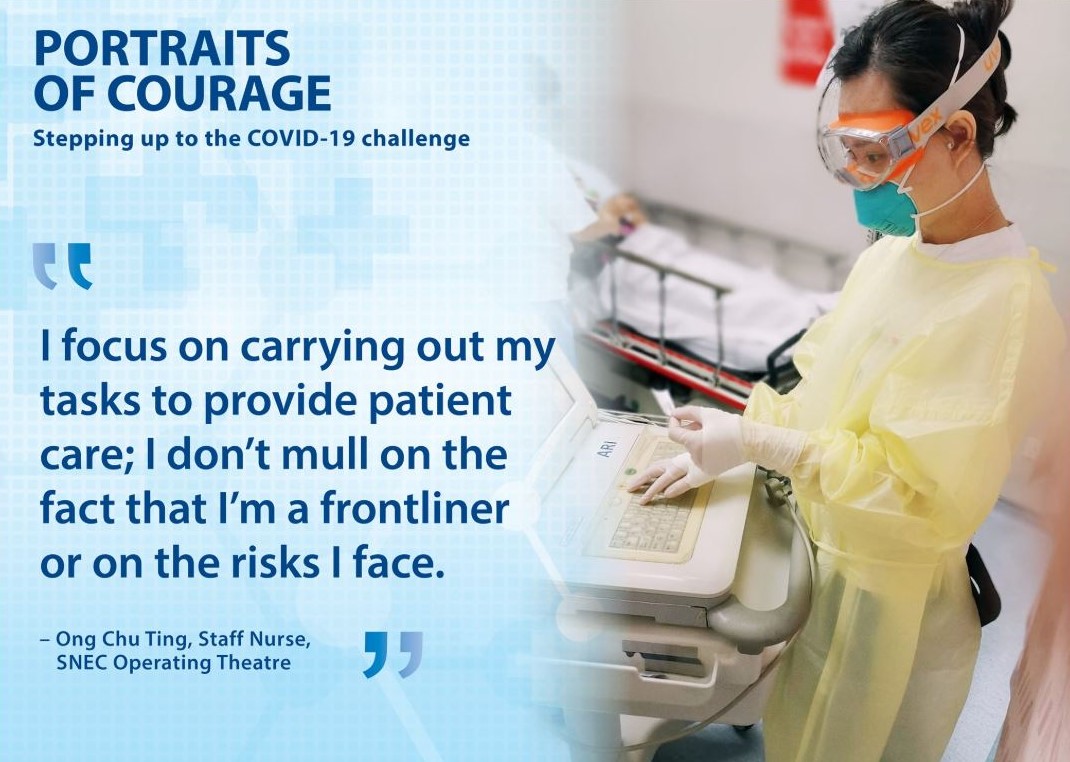
Click here to
read the post.
International Nurses Day 2020
To commemorate International Nurses Day 2020, Mediacorp’s Vasantham Tamil Seithi News & Current Affairs Online interviewed SNEC’s Assistant Director of Nursing, Ms Chitra Vallei Govindasamy.
A 34-year veteran of nursing, she shared what inspired her to enter the field, how she finds fulfilment on the job, and the challenges nurses today face when it comes to patient care. She also encouraged and cheered fellow nurses on the frontline of the battle against the COVID-19 pandemic.
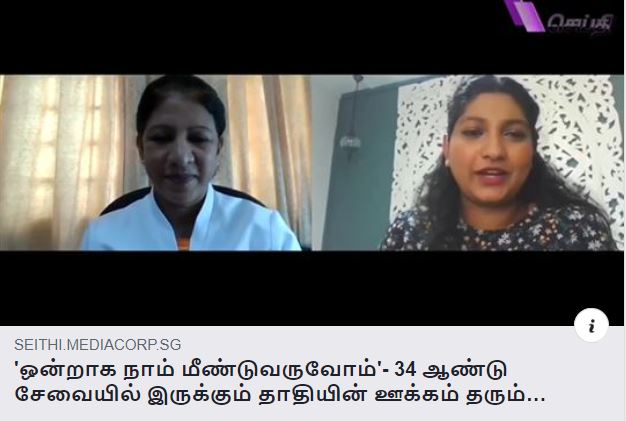
Click here to
read the article.
For the greater good
“My role was to conduct infection control audits without direct patient contact. I had to inspect for tidiness and environmental hygiene at the start of every shift, and make sure that the equipment and consumables are available and adhere to infection control standards. I was required to do 5 audits per shift and ensure that all staff are compliant with infection control practices.”
-
Alicia Tan, Staff Nurse, SNEC Operating Theatre, who was deployed at SGH’s Emergency Department for a month
Despite changes in working hours and location, Alicia recognised the importance of her duties so that patients and staff are kept safe.
We are so proud of you, Alicia! Thank you for your contributions towards the fight against COVID-19!
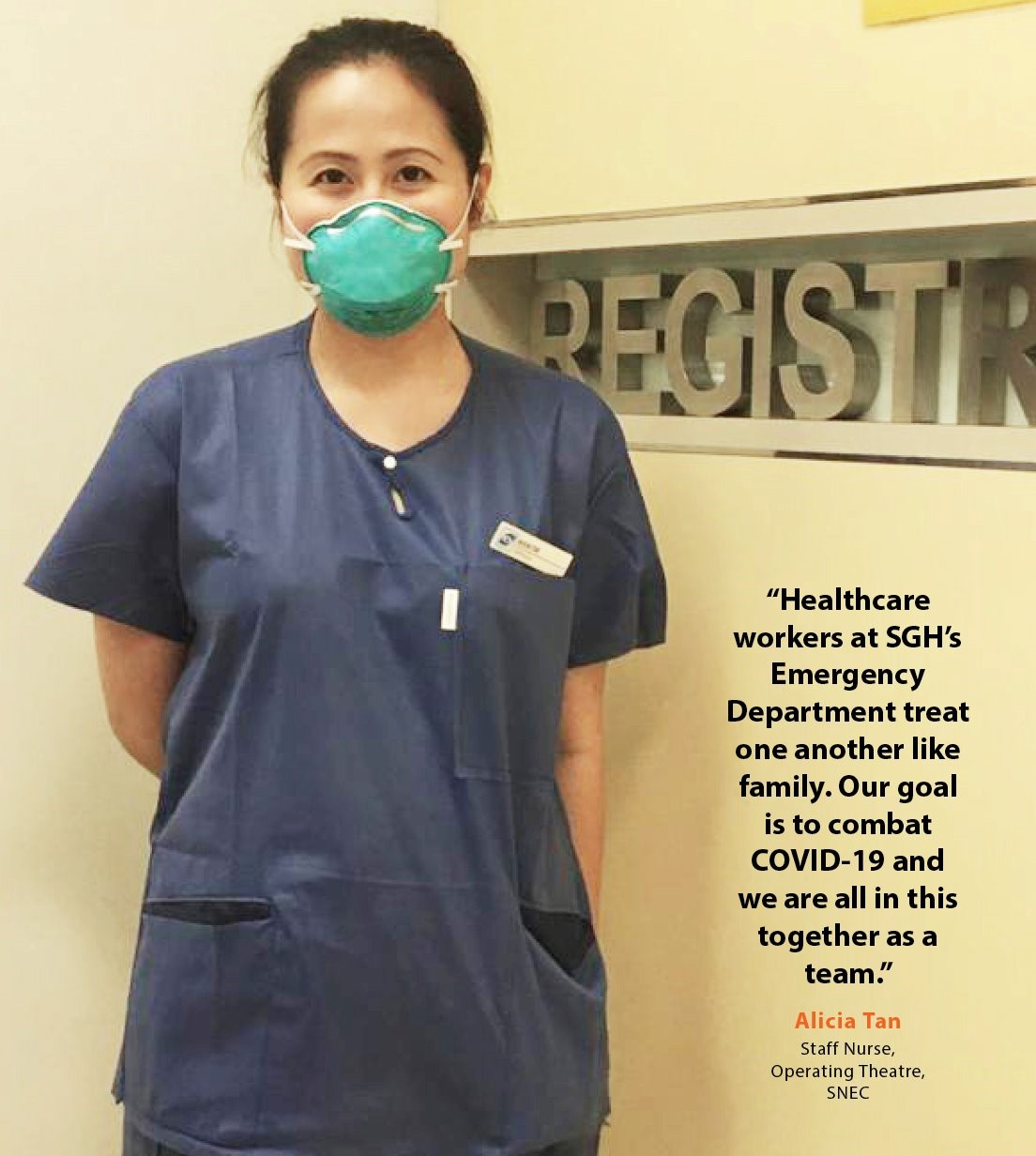
In good hands
"Initially my family and friends were worried about my deployment. But after understanding the situation, they gave me a lot of encouragement and support. The thank you cards and food from the public also kept us motivated.”
-
Sarah Eng, Staff Nurse, Operating Theatre, SNEC
Sarah recently completed a month-long deployment at SGH’s Isolation Ward, where her key role was to ensure other healthcare workers on the frontline were wearing the personal protective equipment (PPE) correctly.
Thank you Sarah for your dedication and stepping up on behalf of SNEC to support the SGH Campus in the fight against COVID-19!
